- Skip to main content
- Skip to primary sidebar

Writing Tips Oasis - A website dedicated to helping writers to write and publish books.

19 Top Creative Writing Workshops in Michigan
By Katrina Kwan

Are you a writer in Michigan who wants to improve your creative writing by taking a class ?
Below you’ll find 19 top creative writing workshops in Michigan.
1. The 2019 Michigan Writing Workshop
First hosted in 2015, Writing Day Workshops is presenting the 2019 Michigan Writing Workshop on May 4 th , 2019 at the Embassy Suites by Hilton Detroit Livonia Novi. The event has limited space for up to 200 guests and offers a wide range of events to participate in, taking place between 9:30am to 5:00pm.
The event is designed to help writers through the publishing process, and will even feature several literary agents from agencies like The Knight Agency, Howland Literary, and more. It costs $189 to register for the event. If you’d like a 10-minute one-on-one meeting with a literary agent or editor, it costs an additional $29. Space is still available, so be sure to apply via email .
2. Wellspring Writing Workshops in Ann Arbor
Wellspring Writing Workshops, a group based out of Ann Arbor, Michigan, is hosting their 8-week Spring 2019 Creative Writing Workshop. The most recent workshop took place every Thursday evening from March 7 th to March 28 th . But it’s not too late to register!
The next workshop will be hosted Thursday evenings from 6:00pm to 8:45pm from April 4 th to April 25 th . The workshop itself is led by Julie Marioux, a published author, English teacher, and certified AWA workshop method leader. The cost to register is $200, and each session is limited to up to nine people, so be sure to apply as soon as possible!

3. 826michigan’s Detroit Public Library Writing Workshops
If you’re a young writer between 6 to 10 years old who’s looking to participate in a free writing workshop, 826michigan is currently hosting the weE-Bots at the Redford Branch of the Detroit Public Library. This creative writing workshop assigns its writers new topics every week to stimulate the imagination and provide them an outlet to brainstorm, draft, revise, and publish their work.
This workshop is entirely free and requires no prior-registration. All you have to do is show up between October 1 st to May 20 th on Mondays between 5:00pm to 6:00pm at the library located at 21200 Grand River Detroit, Michigan. Click here for a map of the location!
4. Bear River Writers’ Conference with the University of Michigan
The Bear River Writers’ Conference takes place annually in Northern Michigan near Walloon Lake. This year, this conference takes places over several days between May 30 th to June 3 rd , 2019. A host of talented and experience industry professionals will be attending like A. Van Jordan, Mardi Link, Diane Seuss, and Desiree Cooper.
The fee to sign up for this conference is $645 per person. If you’re hoping to find lodging and meal solutions as well, check out the conference’s lodging and fees page. For more information, or if you’re interested in registering, you can contact the organizing team via email or call (734)763-2342.
5. 8-Week Introduction to Memoir with Kelsey Ronan
Writing Workshops Detroit is currently offering a creative writing workshop called 8-Week Introduction to Memoir , led by Kelsey Ronan. Kelsey has earned an MFA in creative writing from Purdue University and is a former writer-in-residence of the Hub City Writers Project. The creative writing workshop itself begins on Thursday, April 11 th , 2019, and is available to new students for a fee of $415. Returning students are offered a rate of $390.
In this workshop, you’ll learn how to explore major moments in your life and how to recount them with as much detail and emotional impact as possible. The class meets at 1420 Washington Blvd #301 in Detroit at 7:00pm to 9:00pm. The class size is limited to 8 people only, so be sure to register if you’re interested! For more information, you can use Writing Workshops Detroit’s online contact form .
6. Rochester Writers’ Spring Conference
Based out of Rochester, Michigan, the Rochester Writers group is hosting a spring conference on March 30 th , 2019 between 9:00am to 5:00pm at Oakland University. There will be several events at the workshop to help writers of fiction, nonfiction, and business writing. Their main panel will be discussing the process of self-publishing for those creative writers who are interested in getting their projects out to readers without having to jump through the hurdles of traditional publishing.
They are still accepting late registrations for $130, and even offer at-the-door registration for $160. If you’re interested in attending this writing conference, you can apply online or by mail. The exact event will take place at 2200 N Squirrel Road, Rochester, Michigan. For more information, you can email the team at Rochester Writers.
7. Writing the World: A Creative Nonfiction Workshop by Interlochen Center for the Arts
The Interlochen Center for the Arts, which is based in Interlochen, Michigan, offers a wide range of creative writing programs. They are currently offering a creative nonfiction workshop called Writing the World , which takes place over three days between August 20 th to August 22 nd , 2019. The workshop will be led by Jaimien Delp, who is a part of the creative writing faculty and Interlochen College.
The only thing that participants need to bring along is their own laptop to use for writing exercise. The class registration fee is $275 per person, or $250 per person if you register prior to April 1 st , 2019. Space is limited, so be sure to sign up as soon as you can.
8. Creative Writing Workshops with Voice & Vessel
Based out of Grand Rapids, Michigan, Voice & Vessel is a writing studio that offers a handful of different resources for aspiring and established writers. They are currently offering a creative writing workshop both on-location and online. Their latest workshop, Tending the Work , is an online workshop that is geared toward writers who getting ready for submission.
Led by Emily Stoddard, an affiliate with Amherst Writers & Artists and the founder of Voice & Vessel, this workshop also comes with a welcome-kit that provides need-to-know information for writers about the publishing industry and the steps it takes to get published. It starts April 10 th and costs $125 to register. For more information, you’re strongly encouraged to call (616) 350-6210.
9. 8-Week Graphic Novel & Comics Workshop with Shaun Manning
Creative writing isn’t just limited to fiction and nonfiction. It can also include the realm of graphic novels and comics! Writing Workshops Detroit offers 8-Week Graphic Novel & Comics Workshop with Shaun Manning, an experienced comic book writer who’s worked on projects liked Star Wars Adventures, Garbage Pail Kids, and Dark Horse Presents .
The class begins on Monday, April 8 th , 2019 between 7:00pm to 9:00pm at Bamboo Detroit, located at 1420 Washington Blvd #301, Detroit. The class costs $415 for new students, and $390 for returning students. Class sizes are limited, so be sure to register soon!
10. Creative Writing Day at the DIA with Diane Shipley DeCillis
Detroit Working Writers is a community of like-minded writers who share an abundance of creative and professional resources to navigate the literary world. The group offers a variety of workshops, including the third annual Creative Writing Day at the DIA . This workshop recently took place on Saturday, March 16 th , 2019 at the Detroit Institute of Arts. Hosted by Diane Shipley DeCillis, a professional poet and writer, attendants got to learn tips and tricks to expand their creative writing skills. For more information about next year’s event, you can contact the organizer via email .
11. Maranatha Christian Writers’ Conference
Based out of Norton Shores, Michigan, the Maranatha Christian Writer’s group is offering a writers’ conference between September 26 th to September 28 th , 2019. They hope to connect Christian writers with industry professionals, as well as nurture their creative writing capabilities. With faculty speakers like Steven James, Abby McDonald, and Amanda Cleary Eastep, the Maranatha Christian Writers’ Conference is sure to be an excellent opportunity for those writers looking to progress in their careers.
You can register online when registration opens on September 26 th , 2019. For more information, you can contact the team at Maranatha Christian Writers via email . Registration starts at $400 through to June 1 st and increases to $450 after said date, so be sure to register early!
12. The Story Goes On: Writing for Television & the Web with Jill Lorie Hurst
The Michigan Actors Studio does a lot more than just offer acting classes. They also offer workshops for television and web writing. As far as creative writing goes, writing for an entirely new medium requires a certain level of guidance for those interested in breaking out into a new field of entertainment. They currently offer the workshop, The Story Goes On: Writing for Television & the Web , instructed by Emmy award-winning writer Jill Lorie Hurst.
This 8-week intensive class goes over things like character development, two-person scenes, pitching story ideas, script formats accepted by major networks, and more. The glass begins April 9 th , 2019 from 11:00am to 1:00pm and costs $270 to register (prior to March 22 nd ). After this date, registration fees go up to $295. All classes take place in Ferndale, Michigan. If you have any questions, you can email the studio or call (877) 636-3320.
13. Family Literacy Workshops with Eastern Michigan University
The Eastern Michigan University has an express goal of helping their community when it comes to improving literacy rates. Based out of Ypsilanti, Michigan, they offer several workshops for families, teens, and parents to help make reading and writing fun for everyone!
They currently offer workshops like Family Writing Fun Night , which is a 90-minute workshop designed to help families engage in creative writing activities. Registration starts at $450. They also offer Writing Palooza , another 90-minute creative writing workshop designed for teens to work on fiction and creative nonfiction projects. You can find a full list of workshops offered by the university here . For more information, you can contact the office of campus and community writing via email or call (734) 487-0694.
14. Michigan Youth Arts Festival Creative Writing Workshop
The Michigan Council of Teachers of English is currently hosting the Michigan Youth Arts Festival Creative Writing Workshop from May 9 th to May 11 th , 2019. Students in grades 9 through 12 are encouraged in creative writing projects in categories like short stories, poetry, playwriting, graphic narration, and creative nonfiction.
The workshop is run by Joseph Zettelmaier, a Michigan-based playwright and fourth-time nominee for the Steinberg/American Theatre Critics Association award. The workshop takes place at 1903 Western Michigan Avenue at Western Michigan University. For more details, you can contact that organizer directly via email .
15. Youth Summer Writing Camps with Oakland University
If you are interested in participating in a writing camp, Oakland University is currently offering several programs for the summer of 2019. This camp is available to all students for a registration fee of $250. Based out of Rochester, Michigan, the summer camp hopes to facilitate a creative space where they can be both inspired and hone their writing skills. They are currently open for registration at this time, so you just have to pick a time between July 8 th to August 12 th that works best for you. If you should have any questions, you’re encouraged to contact the camp director via email .
16. Be A Better Writer with Wow Writing Workshop
Wow Writing Workshop is based out of Royal Oak, Michigan. They offer a wide variety of writing services for students, parents, and even SAT test preparation. They also offer workshops to help aspiring writers organize their ideas and begin their writing journey. They are currently offering Be A Better Writer , an intensive four-day workshop led by Joe Kane.
Topics that will be explored include argument building, diction, understanding the audience, thought organization, and more. You can sign up for the workshop today for a registration fee of only $289. You can sign up directly on Wow Writing Workshop’s website . For more information or general inquiries, you can also reach the team through their online contact form .
17. The Narrative Time Machine: Pacing and the Narrative Arc with T.M. De Vos
The Narrative Time Machine: Pacing and the Narrative Arc is an intensive four-week workshop led by T.M. De Vos. De Vos earned an MFA in creative Writing from New York University and has won several awards for her short fiction. The course itself starts April 10 th , 2019 and takes place every other Wednesday from 6:30pm to 9:00pm. Classes are limited to 8 writers, so it’s imperative that you register as soon as possible. Hosted by Writing Workshops Detroit, it costs $225 to register .
18. Remembering and Writing with Kathleen Ernst
Door County Reads is currently hosting several book discussion and writing workshops, including Remembering and Writing with Kathleen Ernst. The workshop is taking place February 8 th from 1:00pm to 4:00pm in Fish Creek, Michigan. Designed for memoir writers and fans of food, this workshop will discuss techniques for preserving original memoirs and explore food-related memoirs. If you’re interested in joining, you can call (920) 868-1457 or register via email .
19. UPPAA 2019 Spring Meeting
The UPPAA is a collective of writers that focuses on cultivating literature and writers from the state of Michigan. They are currently organizing their annual UPPAA meeting, to be held on June 1 st , 2019 in Marquette, Michigan. Members of the organization get to attend for free, while non-members only have to pay $15 to attend. The meeting hopes to offer networking opportunities and provide feedback on creative writing projects. You can register online or via mail. Be sure to check back closer to the event’s date for a detailed schedule of events. For general questions, you can contact the UPPAA’s secretary via email .
Do you know of any other creative writing workshops in Michigan? Please tell us about them in the comments box below!
K. Z. Kwan is a freelance writer based out of Halifax, Canada.

- Testimonials
- Writer’s Diagnostic
- Time Management Questionnaire
- Resources by State
- Beta Reading, Critique & Workshops
- Publication Assistance
- Editing & Proofreading
- Ghostwriting
- Request Services

Michigan Resources for Writers
Here you’ll find a collection of resources for writers in Michigan, from conferences to local critique groups to literary magazines. If you’re looking for writing groups near you, writing workshops near you, creative writing classes near you, or simply a place to hang out with writers or submit your work, these are some Michigan writing organizations you might want to check out:
WriteByNight
For more than a decade, WriteByNight has helped writers in Michigan and beyond achieve their literary goals. And we want you to be next! Claim your free consultation to learn about WBN’s customizable one-on-one writers’ services , including:
Book Coaching : If you’re writing a book and want some help along the way.
Manuscript Critique : If you’ve written a book and want a beta read, critique, or writing workshop.
Editing/Proofreading : If you’ve written a book and want someone to polish it for you.
Publication Assistance : If you’ve written a book and want help finding an agent or publisher.
A Rally of Writers
An annual day-long writers conference in Lansing featuring discussion panels about writing and publishing.
Bear River Writers’ Conference
Offers writing workshops, panels, readings, and more amid the beauty of Northern Michigan.
Detroit Working Writers
Men and women from around the country working, writing and publishing in numerous genres with a common goal: to foster excellence in writing and serve as a creative and professional resource for one another and the community.
The Detroit Writers’ Guild
A nonprofit organization located in Detroit. It was founded in the summer of 1983 out of a concern for the lack of books for black children written by black authors in the Detroit Public School System.
Flint Area Writers
A critique group since 1942, the Flint Area Writers also offers retreats, reading, and other events.
Grand Rapids Region Writers Group
Meets in Kentwood monthly for discussion panels, and hosts a yearly writing workshop.
Michiana Writers’ Workshop
A writing group meeting twice a month in South Bend to workshop new writing and discuss publishing news and trends. Welcomes writers of all stripes living in north-central Indiana and southwest Michigan.
Michigan Quarterly Review
Michigan Quarterly Review , founded in 1962, is the University of Michigan’s flagship journal, publishing each season a collection of essays, interviews, memoirs, fiction, poetry and book reviews.
Michigan Writers
Michigan Writers is a vibrant community of people who appreciate the written word. Members help to actively foster a vital literary community by encouraging, supporting and connecting writers of all ages.
Poetry Society of Michigan
A member of the National Federation of State Poetry Societies, PSM encourages and celebrates poetry groups across Michigan. Offers workshops, contests, and publication opportunities in Peninsula Poets literary journal.
Rochester Writers
Founded in 2008 in response to a need for professional development in the Southeast Michigan area for new and published writers.
The Scarab Club
One of Michigan’s finest venues for art, music and literature.
Walloon Writers Review
An annual literary magazine publishing fiction, poetry, photography and other work inspired by Northern Michigan and the Upper Peninsula.
Help us add to this list, Michiginians! Do you know of writing groups near you, writing workshops near you, creative writing classes near you, or a Michigan literary journal we should be aware of? Let us know here
Without a doubt, taking that first step in the writing course from WriteByNight landed me in the position of having my book published and a dream fulfilled. Marcia Drut-Davis Stuart, Florida
Client Credits
WBN has helped writers publish with:
Simon & Schuster Little, Brown & Co. St. Martin’s Press Amazon Slate Threepenny Review Huffington Post
WriteByNight, LLC 235 West End Avenue, 6H New York, New York 10023
646.374.8174 [email protected]

To encourage creative writing of the highest professional standard and serve as a creative and professional resource for one another and the community.
As you might expect from a writing organization founded in June of 1900 that has stood the test of time, members of Detroit Working Writers are top-notch and productive. In this space we’ll feature posts on writing advice, marketing tips, publication news and more.
If you’re a DWW member with a new publishing credit, tips or news to share, we want to hear from you! Please email DWW’s President, Theresa Nielsen, at [email protected], and we’ll feature you in a future post.
To read the latest news from our members, just click on a photo below.
Already a member and need to pay your dues?
You no longer have to navigate to the “members only” section to access the link to pay your dues. (To find out how to join DWW, please click on “Application” in the menu bar. Click the “Pay with PayPal” image to pay your DWW Membership Dues.
Not a member?
Navigate to “ Apply for Membership “

latest from

2023 Holiday Party for Members

Thoughts about Handwriting

Doing Your Own Thing by Cindy LaFerle

Review: Using Scrivener for Family History and Memoir Writing by Laura Hedgecock

How I Got My Publisher By Annemarie Schiavi Pedersen

Writing in Detroit, about Detroit by Laura Bernstein
- Go to page 1
- Go to page 2
- Go to Next Page »
- Email Address *
- Confirm you are human
Welcome to the Writing Center at Michigan State

Schedule An Appointment With Us!
What we offer....

We support students by offering one-on-one peer writing consultations, writing workshops, graduate and creative writing groups, and student employment opportunities.

Faculty and Staff
We support faculty and staff by offering a writing across the disciplines workshop, grant writing support, professional development resources, writing groups, and syllabus development.
Please contact us for personalized writing support.

We work to meet the community’s literacy needs by offering consultations in collaboration with the East Lansing Public Library through the Community Writing Center and through additional projects housed with our Community Composing Project.

Writing Center Field
We value contributing to writing center studies and fostering professional partnerships by working with other university and community literacy centers both across the United States and internationally.
Collaboration

“There’s no space that I learned more about how to be a teacher and how to work with students than The Writing Center at MSU. No matter any of its problems, I believe in The Writing Center and what it does and what it’s trying to be for students.”
Wonderful Faison
English Department Chair at Langston University and former Writing Center Consultant
Quote from the Writing Center @ MSU’s Oral History Project
- Vision Statement
- Accessibility Statement
- Language Statement
- Locations and Hours
- Linguistic Justice: A Speaker Series
- Writing Centers and Access: A Speaker Series
- Storytelling as Activism: A Speaker Series
- Writers Across the Curriculum: A Speaker Series
- To and From: Publications and the MSU Writing Center
- How to Become a Consultant
- Administration
- Consultations
- Writing Group Catalog
- Navigating the PhD Workshop
- Navigating the Master’s Workshop
- Education Abroad
- Tabling Resources
- Writing Engagement Liaison Program
- Strategies for Teaching Across Fields
- The Community Writing Center
- Schedule an Appointment

Wellspring Writing Workshops

Energize your Writing
Body/Mind/Spirit

"...and your very flesh shall be a great poem." ---Walt Whitman
Click here to learn about workshops.
Join the mailing list.
Links to Articles/Studies on the Healing Power of Writing
Julie Mariouw leads writing workshops designed
to help writers bypass their inner critic; go directly to images, feelings, & memories; and tap into the healing power of writing. Julie creates writing prompts using metaphor, the senses, polarity and the physical body, to expand writers' imaginations & increase their creativity. Julie is an Amherst Writers & Artists Affiliate, and is certified to lead workshops in the AWA method.
Julie believes that:
Writing has unlimited power to heal.
Writing belongs to all people.
Each writer has a unique voice.
Writing in this workshop reconnects writers with their bodies & promotes physical healing.
Writing in this workshop increases sense memory & recall of prior life experience.
Writing in this workshop expands the imagination.
Writing in this workshop produces work that may not have been possible alone.
Writing in this workshop enhances individual healing.
Teaching of craft can be done without damage to the original voice/self-esteem of the writer.
A writer does not have to become personally vulnerable in order to write from the deepest places.
The Workshops:
5 - 8 people in Online Workshops using Zoom.
5 - 8 people in In-Person Workshops--On-Site in Chelsea, MI.
Drop-In Writing sessions in Chelsea, MI.
Individual sessions--Online & On-Site in Chelsea.
Attention to craft is taken seriously, and offered through 1 - 20 minute writing exercises.
Writers, if they wish, read their work aloud.
Comment only on what is strong and successful in the work.
All writing treated as fiction.
Writing that happens in the workshop is not discussed outside of the workshop.
Workshop leader writes with everyone else, establishing equality of risk and mutual trust.
CONTACT JULIE:
wellspringwritingworkshops.com
Link to Studies/Articles on the Healing Power of Writing
Emotional & Physical Benefits of Expressive Writing
Evaluation of College & Low Income Youth Writing Together
Expressive Writing, Emotional Upheavals, & Health
Healing through Writing: Insights from Research
Research on Creative Writing & Therapeutic Effects
Join the Mailing List
Get notified of upcoming workshops
"RITUAL, MEMORY, & PURPOSE
from The Healing Wisdom of Africa
by Malidoma Somé
"Ritual provides not only healing but also the recovery of memory and the reaffirmation of each individual's life purpose. How does ritual recover memory? When we focus our attention on the energetic aspects of individuals and of nature that animate and

motivate us, we become aware of images and emotional impressions that are unusual, extremely compelling, and as a result, captivating in terms of the amount of attention they demand.
Inside ritual and sacred space where energies are being woven, people's imagination and consciousness can be moved through time backward or forward. It is as if the awakened psyche is pulled toward those materials it was not able to recall otherwise. This is a shamanic journey, and it can be a very useful tool for entering these depths of time and space without actually having to expend energy and move physically. The kind of memory we are talking about here is something very personal, very compelling, and very transforming."
A WALK BETWEEN HEAVEN & EARTH
by Burghild Holzer
"Talking to paper is talking to the divine. It is talking to an ear that will understand even the most difficult things. Paper is infinitely patient. It will receive small fragment after fragment of a large network you are

working on, without you yourself knowing it. It will wait out decades for you to put together the first faint traces of your own code, a code you might have understood as a small child but which you're now gathering on a new level of understanding. The white paper is waiting. Each time you scratch on it, you trace part of yourself, and thus part of the world, and thus part of the grammar of the universe. It is a huge language, but each of us tracks his or her particular understanding of it."
"IMAGES & CREATIVITY"
from an interview in The Paris Review with Lynda Barry
"I believe that the arts are like an external immune system. I believe that they have a biological function. The fastest way I can explain it is that there is this brilliant

neuroscientist named V. S. Ramachandran, who wrote a book called Phantoms in the Brain . He was very interested in people with phantom-limb pain, and he had one patient who had lost his hand from the wrist down, but the guy's sensation was not only that the hand was still there, but that it was in a painful fist that kept clenching. Ramachandran built a box, with a mirror and two holes in one side. When the guy put his arms in, he saw the one hand reflected. When he opened the hand, he saw it open and it was like the missing hand was unclenching. It fixed his phantom-limb sensation.
That's what I think images do; that's what the arts do. In the course of human life we have a million phantom-limb pains---losing a parent when you're little, being in a war, even something as dumb as having a mean teacher---and seeing it somehow reflected, whether it's in our own work or listening to a song, is a way to deal with it."
"THE INTUITION THAT PROVIDES THE MATERIAL"
from The Soul Tells A Story by Vinita Hampton Wright
"The creative person inside you---the right side of the brain---needs a lot of space and understanding. He's sort of like the classic extravert who learns what he thinks by talking out loud. He spills information before it even makes

sense. And he's so expressive while doing so---just full of passion, emotion and energy. Forget about getting him to break down his thoughts and put them in order---he can't do it. That's why he needs his partner, the introverted editor, the quiet self that stands by and studies everything that's flying out of Mr. Personality's mouth.
You have to just let Mr. Personality have his say. You have to be quiet and let him ramble. The moment you get critical or start asking questions, his feelings will get hurt or he'll become irritated and shut up. So just stand by and listen and watch. Take notes but be quiet.
When you allow the creative flow to happen without interruption, what comes up from the well could be almost anything. It may be fraught with emotion---or not. It may be connected to your dream life. It may bring up forgotten memories or add details to memories you already have...For some reason the stream of consciousness cannot flow when the more logical thinking process kicks in.
...I can't stress enough that you can trust this flow. You can trust it because it is merely raw material; it is not the finished product that you're stuck with. Once you consider all your words raw material, you will be much freer to just write whatever comes. And you will also be much freer to do whatever you need to do with what comes.
...A lot of fear regarding your creative life will subside when you accept that the most wonderful stuff is in you already. It's there and waiting to be found."
"THE WRITER'S WORKSHOP"
from Writing Alone & with Others
Pat Schneider
"We write together---leader as well as participants---in response to a suggestion given by the leader. The leader's participation in writing and reading brand new work aloud is absolutely central to this workshop method. If the

Aug 11, '18 Writing Workshop
leader of a group stays safe, there is hierarchy, and the group members' safety is compromised. When the leader reads aloud, is honest about fear...the members of the group are empowered.
Writing together is an experience entirely unlike any that I ever had in elementary or high school, in college or graduate school...I don't know how to express the almost ecstatic experience that rather frequently happens when people write together and affirm one another's new work. There are so few places in our normal social lives where we are privileged to meet one another so vulnerably--to laugh and cry and laugh again.
Because there is no critique or discussion of first-draft work, we venture out with our words, often prefacing them by disclaimers, but daring to read them anyway, and hearing that they are accepted and respected. When we are funny, we get to hear the reward of our listener's laughter. Sometimes when we grieve, someone else weeps with us. We never discuss that work, not even to mention it at break over coffee and brownies. It belongs to the writer. But each of us has been heard and affirmed.
...When we write together in a workshop, we do not have time to revise or even read over to ourselves the words that we read aloud. To read under these circumstances is a powerful and sometimes emotional experience, both for the writer and for the listener. Our practice, upon hearing work that has just been written, is to mention 'what we remember, what stays with us.' This saves us from too much sweetness and the temptation to dishonest praise...I don't need someone to tell me my writing is good. I need someone to tell me, 'I see that kid putting the nickel in the jukebox.'
...Traditional teaching of writing has too often emphasized what is wrong. Most of us understand instinctively how to encourage and assist a child to do creative work. If a child brings you a picture of a bird in flight she has just drawn with a blue crayon, and you see that the left wing is hanging awkwardly down the page, but the right wing is soaring, you do not say, 'By the way, that crooked left wing looks really stupid.' You say, 'Oh, look! Look how that right wing is lifted by the air! I can just feel the flying!' The child looks at the picture, and what does she do? She goes immediately to her crayons and draws the left wing so it, too, soars."

Created by Julie Mariouw - 2016
Try searching for
- Concerts and Events
- Employment / Jobs
- Faculty and Staff
Applications are still open for Arts Camp and Arts Academy. Programs fill quickly—submit your app today!
Writers retreat.
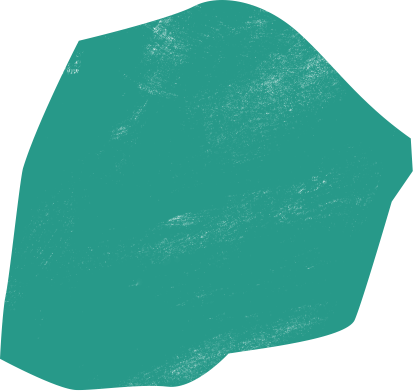
Why Attend the Writers Retreat
Nestled deep in the woods between two lakes, Interlochen College of Creative Arts' five-day Writers Retreat is a true writer's dream. Spend your days writing new material, attending presentations by award-winning faculty, and enjoying lakeside lunches and evening readings while making friends and connections in the literary world.
Select your concentration from four unique courses, each grounded in different craft concepts with an emphasis on generating new work—appealing to both advanced and beginning writers alike. Courses descriptions will be posted in December.
Generate new material across an array of genres, or apply new knowledge to your existing drafts as you gain skills in the classroom and write independently during “off” hours. Attend provocative presentations by faculty, as well as readings by faculty and participants. Enjoy the beauty and inspiration of the Interlochen campus while making connections in the literary world that will last for years to come.
2024 Writers Retreat Faculty:
- Conflict & Resolution Clinic - Ignatius Valentine Aloysius
- A Sense of Place - Patricia Ann McNair (SOLD OUT)
- The Inspired Habit: Daily Practice, Experimentation & Discovery - Anne-Marie Oomen (SOLD OUT)
- Adaptations: From Page to Stage & Screen - Lesley Alicia Tye
- Building Character - Mary Kay Zuravleff
- Faculty workshop descriptions can be found below.
2024 Guest Speakers:
- Desiree Cooper
2024 Writers in Residence
Fleda Brown
Christine Maul Rice
Course Dates: Sunday, June 9 to Friday, June 14, 2024 Registration Fee: $695 Michigan Writers Registration Fee: $600 Registration Deadline: Sunday, June 2, 2024 On-Campus Lodging: Participants can enjoy 10% off at the Stone Hotel and Cottages . Call 231-276-7570 for reservations or book online . Register Here K-12 Educators: Earn 22 State of Michigan SCECH clock hours by attending the 2024 Writers Retreat.
Anne-Marie Oomen and Katey Schultz ICCA Creative Writing Scholarship.
C. Joanne Grabinski established the Anne-Marie Oomen and Katey Schultz ICCA Creative Writing Scholarship to honor the founding Artistic Director of the Writers Retreat, Anne-Marie Oomen, and former Artistic Director of the Writers Retreat, Katey Schultz, in recognition of their vision and leadership in creating opportunities for adult writers to develop and hone their creative practice. The Oomen-Schultz scholarship is awarded annually to (one or more) eligible participants in the Interlochen College of Creative Arts (ICCA) Writers Retreat. The scholarship funds awarded will cover the applicant’s registration fee for the retreat. Award is competitive and merit-based. Apply Here
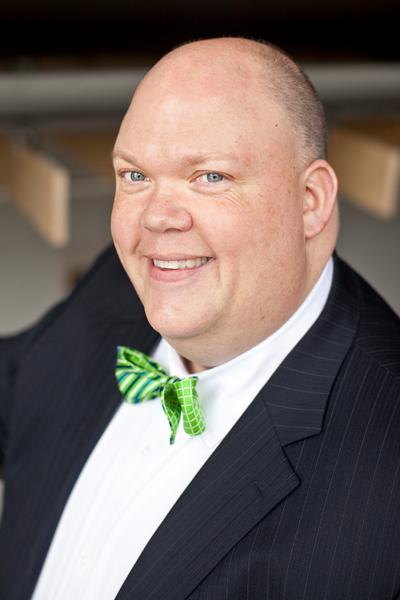
Please bring materials to take notes and work on writing assignments. In workshops, you will usually use journals and pens, but a laptop can be handy during the week. A USB Flash Drive (memory stick) is also recommended. Printers and Wi-Fi will be available.
Conflict & Resolution Clinic with Ignatius Valentine Aloysius In this workshop, we’ll dive deep into the art and practice of writing compelling conflicts and exploring meaningful resolutions. We’ll look at examples in literature as we explore different conflict types, experiment with escalation, tone, and action (or inaction), and find strategies to achieve transformative resolutions. What is the right type of conflict for your chosen form, and can you tease tension within it to hold the reader’s attention to the end? Learn how conflict and resolution can help shape your characters’ worldviews and their outcomes for better or worse. All genres and all levels of experience are welcome. If Oscar Wilde once said, "The heart was made to be broken,” let’s find all that can embrace its true self.
A Sense of Place with Patricia Ann McNair “A place belongs forever to whoever claims it hardest, remembers it most obsessively, wrenches it from itself, shapes it, renders it, loves it so radically that he remakes it in his own image.” -Joan Didion. In this workshop, we will explore the impact of place on our narratives. From Grandmother’s kitchen, to newfound galaxies, to the colorful streets of Havana, Cuba, stories set firmly in the places they inhabit lure readers in and connect them with memory, metaphor, movement, and more. Whatever you are writing—nonfiction travel pieces; small town narratives; stories of journey and destination (imaginative or realistic); domestic, home-tied tales, etc.—a sense of place is essential to the creation. Through reading and writing activities we will discover new work and reinvigorate ongoing material. Open to all genres and levels of experience.
The Inspired Habit: Daily Practice, Experimentation, and Discovery with Anne-Marie Oomen How can inspiration be a habit? Isn’t inspiration a moment of such sudden newness it is associated with life-giving breath—that sudden gasp of understanding? Oh that’s it! It even rises from the Latin noun, inspirare , meaning to "blow into, breathe upon. The word connotes light and flame, even inflammation. Metaphorically, the sudden understanding associated with inspiration always seems like an inhalation of literary oxygen, changing colors in the mind like oxygen changes the color of blood. Something coming to life. Feels pretty miraculous. But what happens if, instead of waiting to be struck , we writers nurtured inspiration with daily practice and simultaneous experimentation? In this workshop we will consider how inspiration operates not as a rare moment of enlightenment, but as an experience we can build into our daily literary endeavors. I’ll be riffing on Twyla Tharpe’s book “The Creative Habit” but offering a twist toward the literary and the personal. We will explore how experimentation might help us produce new and exciting work. We will even take a field trip! For all levels of experience and skill, open to all genres. Special note: For those who attended Anne-Marie’s “Cross-training” class in 2023, some similar exercises may be explored again.
Adaptations: From Page to Stage & Screen with Lesley Alicia Tye: "The cinema has no boundary; it is a ribbon of dream." - Orson Welles This workshop is for writers looking to adapt their fiction or nonfiction to the stage or screen. Through exploration of examples and specific structure tools, participants will come away with practical ways to approach adaptations. Participants should bring work with them that they want to adapt, and will get a chance to work at both a scene level of adapting, as well as on larger outlines for full length scripts.
Building Character with Mary Kay Zuravleff “The baby born to Alice had Paolo’s dark brows and golden eyes—surprising, maybe, until you remember that all humans look pretty much alike.” Edith Pearlman, Honeydew In this workshop, we’ll practice techniques for creating vivid and original characters. We’ll choose physical traits that help determine plot and resonate with the story; write believable dialogue that also reveals character; and discover character “tells” that show emotion like bluffing or betrayal. We’ll read, write, and share in a supportive environment. Come populate your fiction with a cast worth remembering!
2024 Writers Retreat Faculty
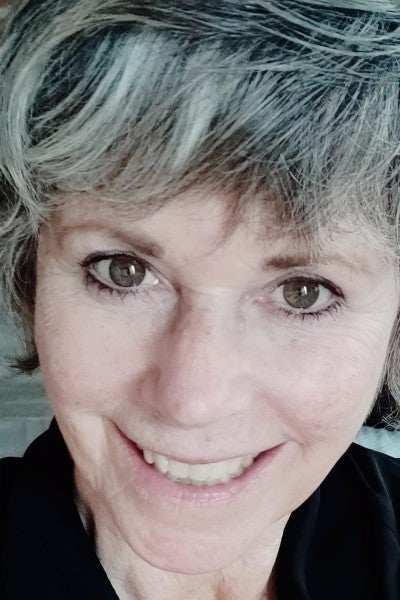
Patricia Ann McNair
Artistic Director of Writers Retreat, Instructor of Creative Writing, Interlochen College of Creative Arts
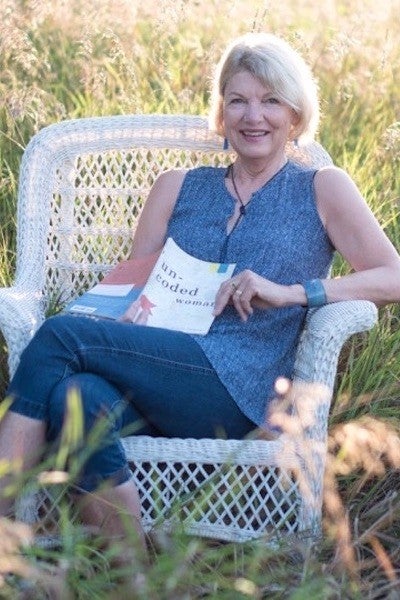
Anne-Marie Oomen
Instructor of Creative Writing, Interlochen College of Creative Arts
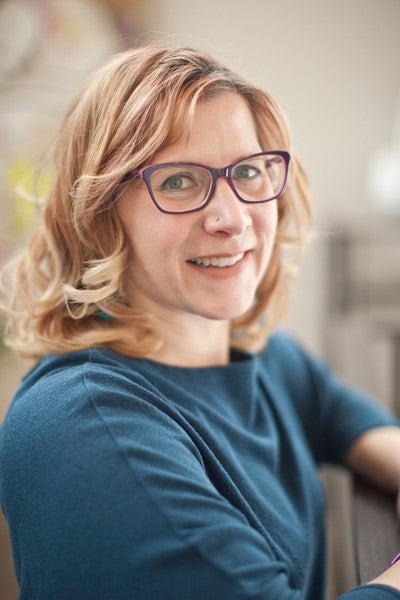
Lesley Alicia Tye
Instructor of Creative Writing and Film & New Media
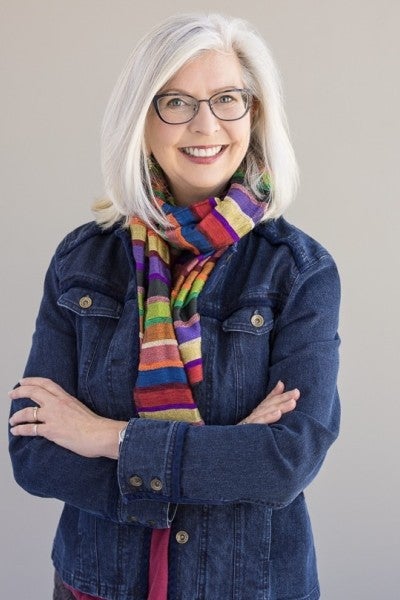
Mary Kay Zuravleff
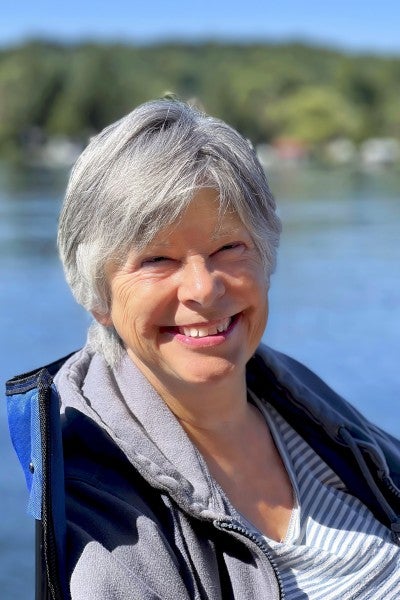
Ignatius Valentine Aloysius
- Exhibitions
- Arts Fair 2024
- Museum Tours
- Kirk Newman Art School
- Art Library
- Docent Resources
- Educator Resources
- KIA In the News
- Memberships
- Plan Your Visit
- Gallery Shop
- Rentals & Private Events
- Creative Writing
- Educate & Learn
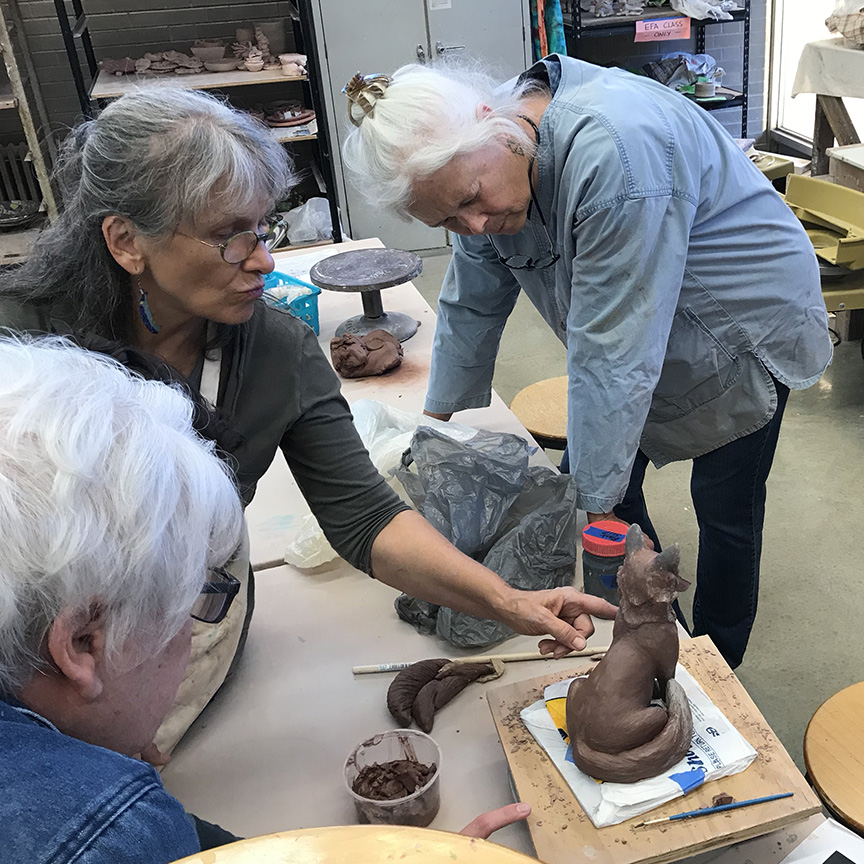
PERSPECTIVES IN PRACTICE
Trevor Grabill & Yve Holtzclaw / Boardroom Wed 4/10-5/15 6:30 - 9 pm / 6 weeks $185 / Members: $165
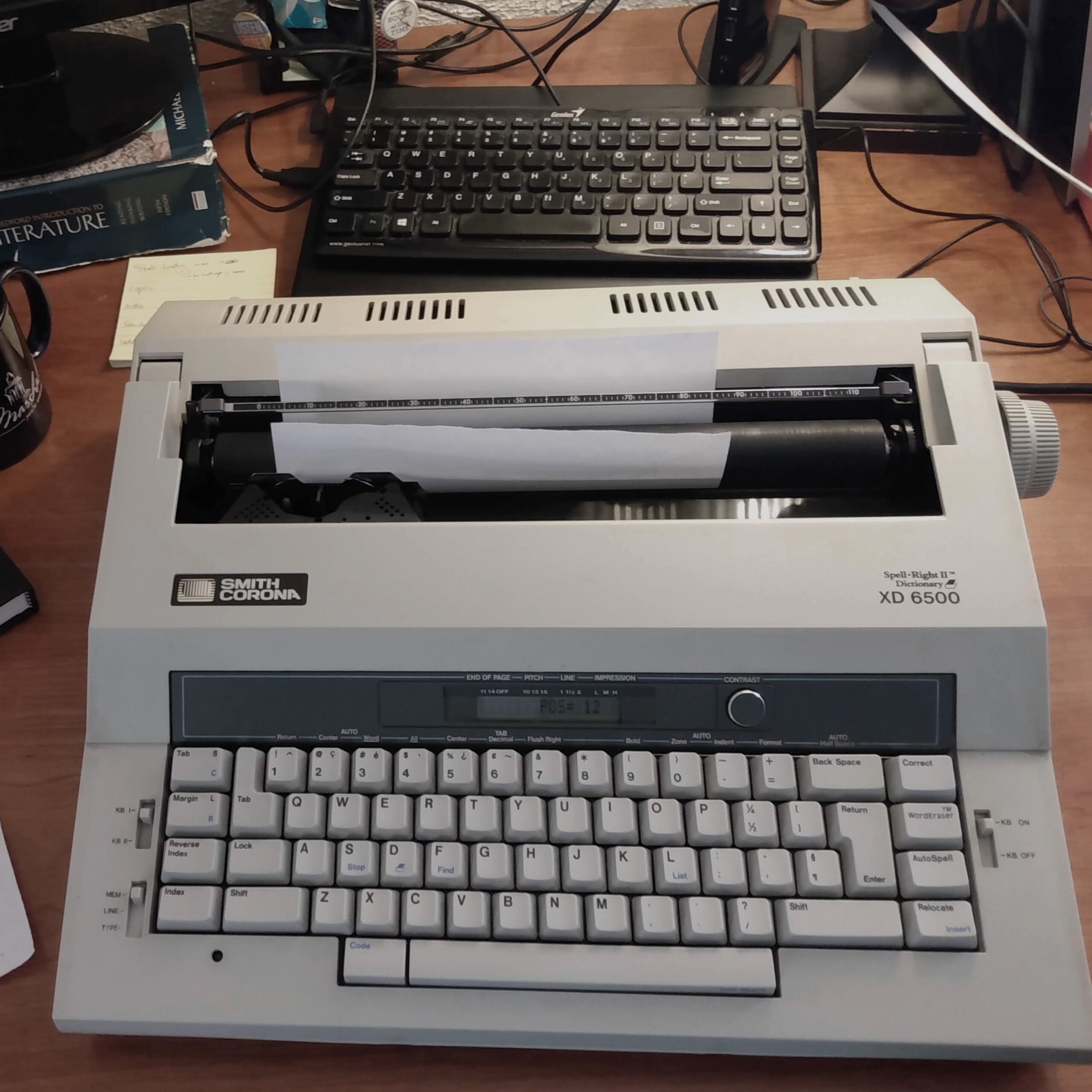
WRITING MEMOIR
Joseph Gross / Online with Zoom Wed 4/10-5/15 6:30 - 9 pm / 6 weeks $185 / Members: $165
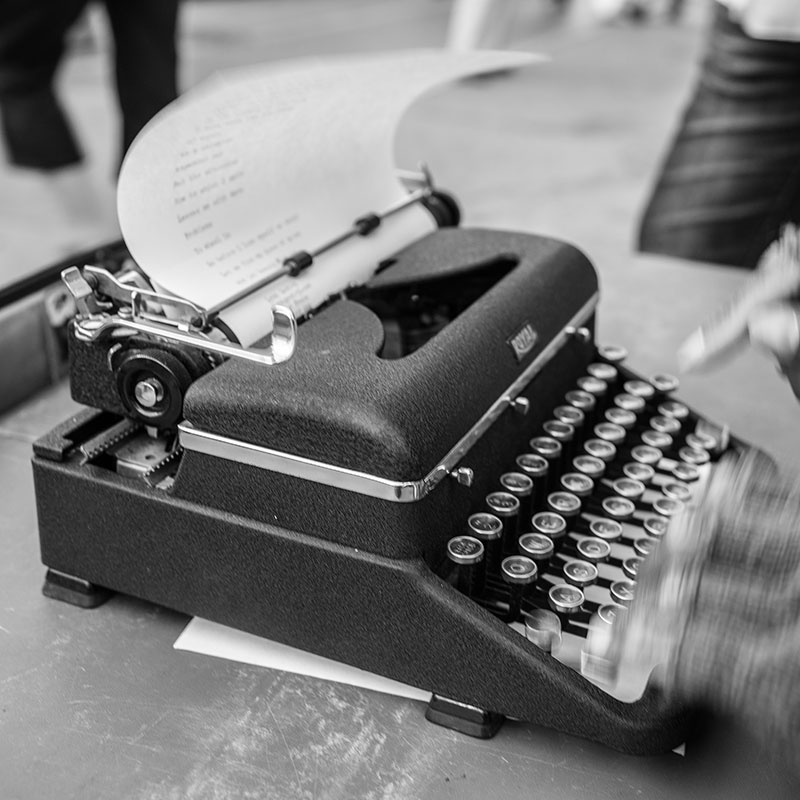
WRITING FICTION
Elissa Cahn / Online with Zoom Thu 4/11-5/16 6:30 - 9 pm / 6 weeks $185 / Members: $165
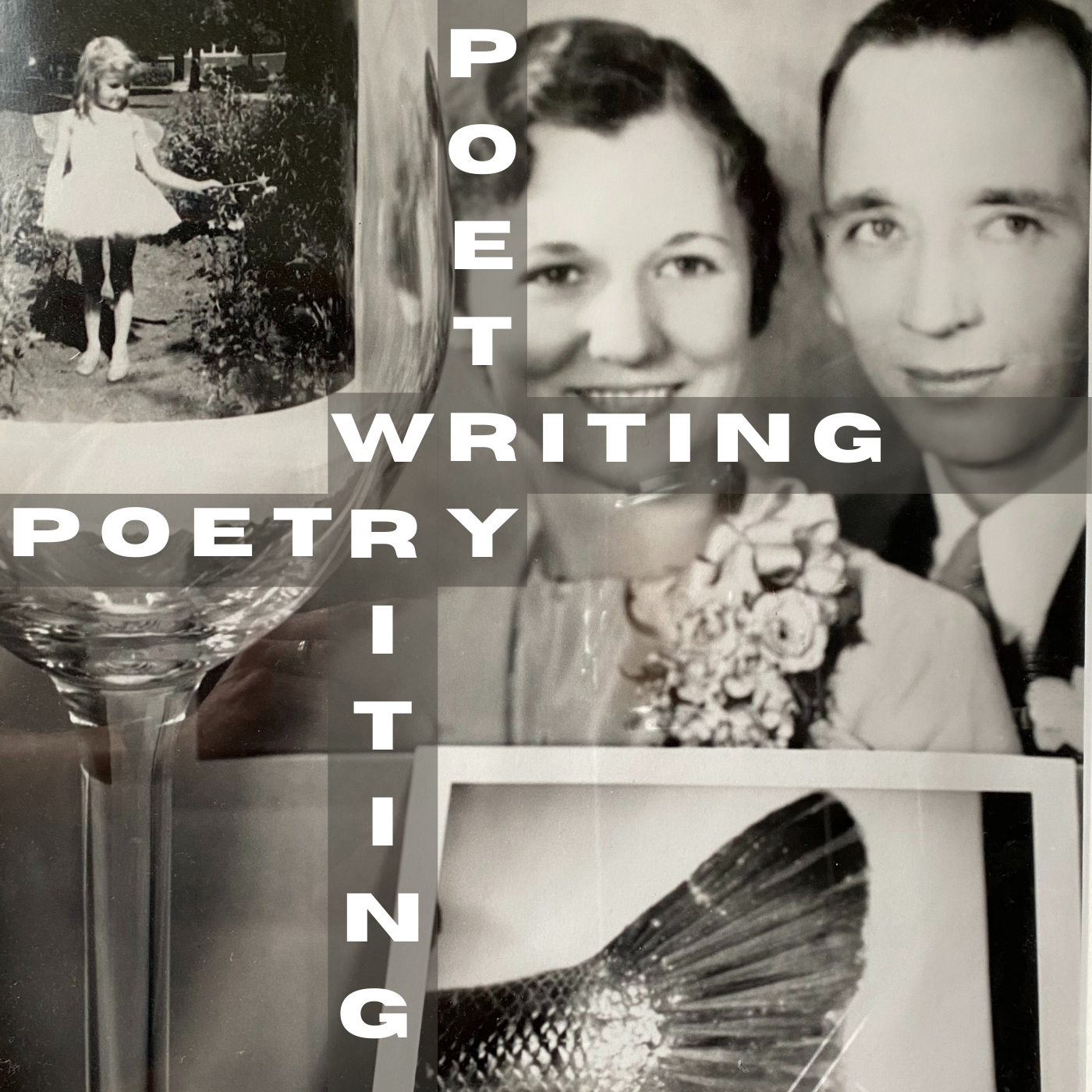
WRITING POETRY
Scott Bade / Boardroom Tue 4/9-5/14 6:30 - 9 pm / 6 weeks $185 / Members: $165
- holder – (do not remove)
- holder-two (do not remove)
- Annual Report
- In the Schools
- After School
- In the Community
- InsideOut At Home
- Publications
- Performances
- Newsletter Sign Up
Every Voice Counts
Since 1995, InsideOut has cultivated the literary and academic skills of Detroit’s students through transformative creative writing programs.
96% of teachers see an overall increase in student grades and report that our program improves their students’ critical thinking and writing skills.

Through InsideOut’s creative writing programs, students learn to think broadly, create bravely, and share their voices with the wider world. We provide students ages 6-19 with opportunities for self-expression, mentoring, academic support, and a platform to be heard.
We have served 70,000 students and counting. At this crucial time in Detroit’s history, we provide youth with the creative tools to build the city and world they want to live in.
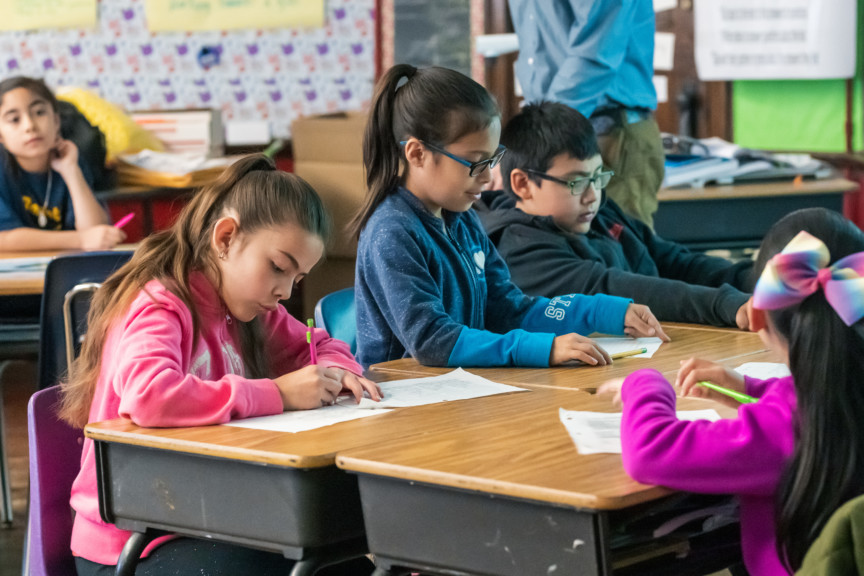
Make a Donation
InsideOut’s focus on social and emotional wellness helps to foster important skills for a happy and healthy life – not only today, but well into the future. By building supportive learning communities, our programs allow students to be their true selves and share their unique voices – tools that last a lifetime. Tools that matter, whether they continue to identify themselves as a “poet” or not.
This program shined a light on what I could do with words. Through writing, I found a new person that I didn’t see before.” InsideOut Student Poet 11th grade, Western High School
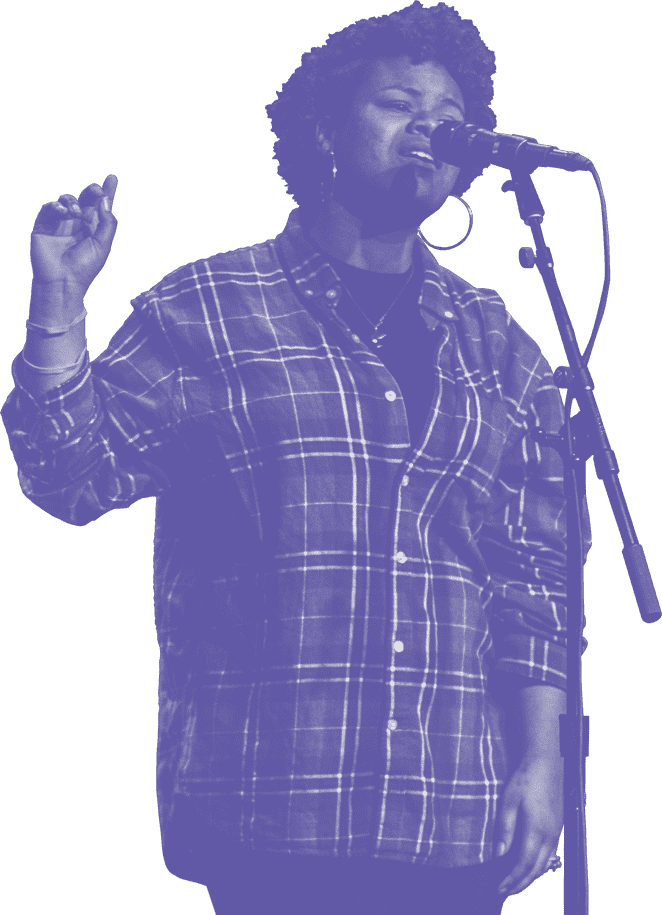
The D. Dan & Betty Kahn Foundation
- Departments and Units
- Majors and Minors
- LSA Course Guide
- LSA Gateway
Search: {{$root.lsaSearchQuery.q}}, Page {{$root.page}}
- News and Events
- Inside East Quad
- Signup for News
- Prospective Students
- Current Students
- Curriculum and Programs
- Community-Engaged Learning
- Alumni and Friends

- Visit the RC
- RC Student Blog
- What RC Alumni Are Saying
- Meet the RC Ambassadors!
- What RC Students Are Saying
- RC Student Groups and Activities
- Request Info & Connect with Us!
- Transfer Students
- Ten Reasons to Join the RC
- Campus Resources
- Incoming RC Students
- RC Advising
- Information for Parents and Families
- Student Academic Forms
- Welcome Week 2023
- Fall 2023 RC Courses
- Internship Opportunities
- Student Life: Orgs & Opportunities
- Arts and Ideas in the Humanities (Major)
- Social Theory and Practice (Major)
- Visual Arts Program
- Creative Writing and Literature (Major)
- BA, BS and BGS degree options
- Language Lunch Tables
Requirements
- Drama (Major)
- First-Year Seminar Program
- Music Program
- Study Abroad
- Spanish Language Internship Program
- Prison Creative Arts Project
- Migrant Worker Education Program
- Robertson Lecture
- East Quad Garden
- Center for World Performance Studies
- Why I Fight, or Team Wristband
- Freedom House Detroit
- Semester in Detroit
- Shakespeare in the Arb
- The Community of Food, Society & Justice Conference, October 2019
- Giving Opportunities
- RC Graduation 2022
- RC Graduation 2020
- RC Graduation 2023
- RC Graduation 2021

The Creative Writing and Literature Major is open to ALL LSA students.
Creative Writing and Literature Majors write fiction, poetry, and creative nonfiction under the close guidance of faculty mentors, and may workshop their writing with other student writers in small writing seminars. Majors also study the art of writing through the study of literature. Majors specialize in fiction, poetry, or nonfiction early in their studies.
Creative Writing graduates pursue successful careers as writers, editors, educators, advertising professionals, and many other writing related-fields. Every year our graduates are admitted to competitive graduate school programs in the fine arts, education, law, business, public policy, social work, and other courses of professional study that demand proficient writing skills and creative approaches to problem solving.
RC Creative Writing students have demonstrated unparalled success in the esteemed U of M Hopwood Awards , winning over 100 awards since the 1994-95 school year.
Students meet with the creative writing major advisor when declaring, making course substitutions, discussing transfer/study abroad credit evaluations, internships, preparing major release forms, and information on graduate school study and career paths.
Although students may pursue study in multiple genres, most specialize in a single genre:
Fiction / Creative Nonfiction
Digital Storytelling
Advising appointments can be made here or by calling RC Academic Services at 763-0032.
Minimum Credits: 28
The major is structured into four genre tracks. In addition to the Fiction / Creative Nonfiction, Poetry, and Digital Storytelling tracks, students may elect a multi-genre track in consultation with their principal writing instructors and the major advisor.
Each track consists of:
Four elective creative writing courses
Five elective upper level literature courses
Fiction / Creative Nonfiction Track
Students complete a minimum of four creative writing courses, at least three of which must be at the 300 level or above and at least three of which must be taken in the RC. A usual track is an introductory course (Narration) and three upper-level courses. Students may count one non-RC creative writing course towards the writing requirement.
Creative Writing Courses: Students may elect any combination of seminars and tutorials from the following:
RCHUMS 220 Narration: Intro to Fiction Writing
RCHUMS 325, 326, 425, 426 Tutorials: Permission of instructor required
RCHUMS 320 Narration: Advanced Fiction Writing
RCHUMS 334 (Section 005) Memoir: Writing from Within
Other departmental offerings listed under RCHUMS 334 or RCCORE 334. Details here.
Literature Electives: Students complete five literature courses, at the 300-level or above. One literature course must focus on either ancient literature or medieval literature (pre-1600). The ancient / medieval requirement may focus on non-Western or Western literature, but must pre-date Shakespeare if a Western literature course is elected. English 367 – Shakespeare’s Plays does not fulfill this requirement, although the course can count towards the literature requirement.
Students are encouraged to take literature courses in the RC Arts and Ideas Major, the Department of English or the Comparative Literature Program . Students majoring in a second language may count one upper-level literature course in that language, or one upper-level literature course completed during a full semester studying abroad in a non-English speaking country. Upper-level literature courses taken abroad also may be counted. All literature courses counted toward the Creative Writing and Literature Major must be at least three (3) credits.
Courses that have been used to meet the requirement in the past include:
RCHUMS 354 Race and Identity in Music
RCHUMS 344 Reason and Passion in the 18th Century
RCHUMS 342 Representing the Holocaust in Literature, Film and the Visual Arts
Other RCHUMS courses listed in the Arts and Ideas in the Humanities major
English 350 Literature in English to 1660 (for ancient/medieval requirement)
English 328 Writing and the Environment
English 379 Literature in Afro-American Culture
Other English Department courses with a literature focus
CLCIV 385 Greek Mythology (for ancient/medieval requirement)
Asian 314 Strange Ways: Literature of the Supernatural in Pre-modern Japan and China
MEMS 386 Medieval Literature, History and Culture
Poetry Track
Students complete a minimum of four creative writing courses, at least three of which must be at the 300 level or above and at least three of which must be taken in the RC. A usual track is an introductory course (Writing Poetry) and three upper-level courses. Students may count one non-RC creative writing course towards the writing requirement.
RCHUMS 221 Writing Poetry
RCHUMS 321 Advanced Poetry Writing
RCHUMS 334 Workshop with Incarcerated Poets and Artists
Literature courses listed above under Fiction / Creative Nonfiction
English 340 Studies in Poetry
English 440 Modern Poetry
English 442 Studies in Poetry
Digital Storytelling Track
The digital storytelling track studies the ways story interacts with technology and the effect of digital media on writing and the creative process. Students electing this track pair writing practice with the study of the theory, ethics, and history of digital media.
Creative Writing Courses: At least 4 courses required over two categories
Creative Writing Courses: choose a minimum of two Residential College creative writing courses that focus on writing fiction, creative nonfiction, or poetry. Only one course in a student’s major plan should be at the 200-level:
Introductory Courses (may elect 1 to count towards major):
Upper-level Courses:
RCHUMS 320 Advanced Narration
RCHUMS 321 Advanced Poetry Writing
RCHUMS 325, 326, 425, 426 Creative Writing Tutorials
Digital Writing / Skills Courses: choose a minimum of two digital storytelling / writing courses at the 300-level or above that focus on digital media and/or electronic literature writing and practice. Courses that have been used to meet the requirement in the past include:
RCCORE 334 (Section 004) Digital Storytelling
English 420 Tech and the Humanities / Electronic Literature
RCSCI 360 (Section 001) Documentary Photography
RCHUMS 325, 326, 425, 426 Creative Writing Tutorials with a focus on writing for, and/or creating, electronic literature or digital media content (permission of instructor required)
Digital Studies Requirement: At least 2 courses required
Choose a minimum of two digital studies theory courses at the 300-level or above that focus on the theory of digital culture and/or the digital humanities. Courses that have been used to meet the requirement in the past include:
AmCult 358 Topics in Digital Studies
AmCult 360 Radical Digital Media
FTVM 368 Topics in Digital Media Studies
English 405 Theories of Writing
Literature Requirement: At least 3 courses required
Literature courses must be taken at the 300-level or above. Literature courses should not focus on digital studies but should offer complementary skills and additional context in the art and craft of literature. One course must focus on ancient/medieval literature. For more information on specific literature requirements, please see the Literature section listed under Fiction / Creative Nonfiction.
A student deemed eligible to attempt Honors typically completes the following process:
A student whose overall academic record meets the eligibility criteria for honors and whose creative work models originality and the promise of mastery in their chosen genre may apply for an honors thesis. Honors theses are typically 75-100 pages of polished fiction or creative nonfiction, or a collection of 25 or more poems. The student and their faculty advisor will determine the exact length and content of the final thesis.
To be eligible to apply for honors, a student must demonstrate exceptional skill in the art and craft of prose, poetry, or creative nonfiction. The student must have completed a minimum of two Residential College creative writing classes, although honors students typically complete three or more by the start of their thesis sequence. The student also must hold a GPA of at least 3.4 overall.
Students who meet the above criteria are eligible to apply for the honors thesis project in the winter term of their junior year, typically by late March. To apply, students shall submit:
A writing sample (10 pages of prose or 5 poems) that represents the student’s best, most polished work.
A brief statement (1-2 pages) describing the honors project. Applicants should also include the name of a faculty member they wish to request as their thesis advisor.
Questions about the submittal process can be directed to the creative writing major advisor here
The Honors Committee, consisting of faculty in the Creative Writing program, will judge the student’s work on its quality, originality, and promise of mastery in their chosen genre. The Committee reviews all honors applications after the submission deadline. Students are notified of the Committee’s decision in late March or early April. If the planned project is accepted for honors, the Committee will assign a faculty thesis advisor to the student.
Honors Theses require a two-semester commitment. Students enroll in RCCORE 490 for the fall term and RCHUMS 426 for the winter term. A passing grade in RCCORE 490 earns a Y grade, indicating that the thesis work will continue into the next semester. At the end of the second term, the Y grade converts to the grade earned in RCHUMS 426. Exceptions to the two-semester requirement are rare but may be discussed with the thesis advisor.
When the honors thesis project is complete (typically the last week of March or the first week of April of the senior year), the student’s honors thesis advisor and one other member of the Residential College’s Creative Writing faculty will determine if the project qualifies for honors and (if so) what level of honors the student receives. Honors thesis students also participate in a public reading with fellow thesis students at the end of the winter term (typically the second week of April).
To download the honors information, click here.
Creative Writing faculty
Laura Kasischke Poetry; Fiction
Christopher Matthews Fiction; Poetry
Sarah Messer Poetry; Creative Nonfiction; Prison Creative Arts Program
Susan Rosegrant Creative Nonfiction; Journalism; Fiction
Laura Thomas Fiction; Creative Nonfiction
A. Van Jordan Poetry, Film Studies
Aisha Sloan Creative Nonfiction, Digital Storytelling
Open to All
You don’t need to be a dedicated major to participate in workshops, tutorials, and classes taught by Creative Writing faculty, which are open to enrollment from all students. If even only for a semester, you wish to explore your interest in writing, consider taking a RC Creative Writing course !
For RC students, creative writing courses fulfill the RC Arts Practicum requirement. For RC and LSA students, RCHUMS 220, RCHUMS 221, and RCHUMS 325 satisfy Creative Expression distribution.
You can participate in the RC Review , our annual student-run journal featuring student poetry, fiction, and visual art. RC students can get a credit for participating in the RC Review.
Or consider joining the RC Creative Writing Forum , which like RC Review, offers RC students a credit, but is open to all for participation.
RC Writers website
Check out the RC Writers Website, for the Residential College writing community.
Recent Events
Paths to publication: a conversation with allison epstein and jon michael darga.
Link to the video recording here: https://www.youtube.com/watch?v=Y6ArrpiEKKc
Love & Zombies & Literature: What makes Genre Writing Literary?
Link to the recording of the webinar on our youtube page: https://www.youtube.com/watch?v=1SD6LC4Zu-0

- Information For
- Faculty and Staff
- More about LSA
- How Do I Apply?
- LSA Opportunity Hub
- LSA Magazine
- Student Resources
- Academic Advising
- Global Studies
- Social Media
- Update Contact Info
- Privacy Statement
- Report Feedback
Creative writing
Wayne State's English department is home to undergraduate and graduate programs in creative writing. Although they exist within the walls of a public research university, our programs belong to Greater Detroit's vibrant community of artists and writers. We encourage connections between our classrooms and the city visible through their windows.
From introductory courses to graduate seminars, we encourage cross-pollinationthe exchange of ideas and influences across literary genres and aesthetic schools and across the differences of identity, culture and experience reflected in the Wayne State student body, among the most diverse in the nation.
Students work with local literary organizations like InsideOut Literary Arts , 826 Michigan and the new Detroit chapter of City of Asylum. Some have worked as editorial interns at Wayne State University Press . Some edit or contribute to our student literary journal, The Wayne Literary Review.
We offer an assortment of fellowships, scholarships and awards for undergraduate and graduate students.
Meet our creative writing faculty
Undergraduate studies in creative writing
In undergraduate courses, students study multiple genres reading exemplary works, learning about elements of craft and aesthetic tendencies in modern and contemporary literature as they generate and revise their own original poetry and prose. We offer introductory and advanced workshops in fiction, poetry and creative nonfiction, along with seminars that combine the practice of creative writing with literary study.
The most introductory course we offer is English 2800: Techniques of Imaginative Writing, but the prerequisite for all upper-level creative writing courses is English 3800: Introduction to Creative Writing. Our most advanced course, English 6800: Advanced Creative Writing, is graduate level and to gain entrance, undergraduates must complete the necessary prerequisites and obtain the permission of the instructor by submitting a brief writing sample: several poems, several pages of prose. Undergraduates majoring in English may specialize in creative writing by following the course sequence.
Minor in creative writing
The creative writing minor allows students to focus their studies in reading and writing poetry, fiction and other creative forms.
For more information and guidance, please contact either the English department's undergraduate advisor or the coordinator of creative writing .
Creative writing undergraduate coursework
All creative writing minors and all English majors who wish to specialize in creative writing are required to take English 3800, a prerequisite for all 5000-level creative writing courses. Visit the Undergraduate Bulletin for a complete set of course descriptions.
- ENG 2800: Techniques of Imaginative Writing
- ENG 3800: Introduction to Creative Writing
- ENG 3810: Poetry Writing
- ENG 3820: Fiction Writing
- ENG 4992: Honors Project
- ENG 5695: Topics in Writing and Publishing
- ENG 5860: Topics in Creative Writing
- ENG 5870: Poetry Writing Workshop
- ENG 5880: Fiction Writing Workshop
- ENG 5885: Topics in Creative Non-Fiction Writing
- ENG 6800: Advanced Creative Writing

Graduate studies in creative writing
Wayne State University offers a master's in English with a creative writing track. Our graduate writing program combines an artistic apprenticeship with advanced literary study and culminates with a creative thesis, a chapbook of poems, a collection of stories or essays and a significant portion of a novel or memoir. Students who don't wish to leave a job or interrupt a career are welcome. Nearly all of our workshops and advanced creative writing courses are regularly offered in the evening.
M.A. vs. M.F.A.
The master's (M.A.) can be an advantageously flexible degree. Because it is not a terminal degree, graduates from our program who wish to may pursue other degrees that are terminal, including the M.F.A . Some come to our program in hopes of beginning or finishing a first book. Some come to produce a nationally competitive portfolio with which to apply to M.F.A. programs or complete coursework that might be credited toward a Ph.D. Our program has also prepared students for careers outside academia, in professional writing, journalism and publishing. For most, the program is valuable in itself. During your four semesters at Wayne State, you study and practice a literary art in a community of equally devoted writers under the expert guidance of distinguished poets, novelists and essayists.
Multi-genre and cross-genre study
Most M.A. students specialize in one of three genres - fiction, poetry or creative nonfiction but many of our writing workshops, seminars and craft courses are multi-genre by design. We believe that writers of prose benefit from the study of poetry, poets from the study of prose and we invite students to experiment in different genres or to blur the boundaries between them.
Creative nonfiction
In addition to poetry and fiction, Wayne State invites graduate students to specialize in Nonfiction. Nonfiction specialists are invited to experiment with and study the genre in all of its variety. They may work in the personal essay, memoir, literary journalism, lyric essay, narrative essay or any of the many species of prose encompassed by the term "nonfiction." We also welcome students interested in such genre-blurring forms as documentary poetry and auto-fiction.
We offer an assortment of fellowships, scholarships and awards . The most generous for creative writers is the Daniel Keyes Graduate Scholarship in Creative Writing. Supported by a gift from the family and estate of author Daniel Keyes, an alumnus of our writing faculty, the scholarships fund three incoming masters students: one specializing in poetry, one in fiction and one in nonfiction. Qualified M.A. students may also apply to work as instructors in our undergraduate composition program. All graduate students and applicants are invited to apply for administrative or teaching assistantships by contacting the director of graduate studies and filling out the English Graduate Admissions and Funding Application Form .
Creative writing graduate coursework
M.A. candidates in creative writing take a multi-genre workshop taught on rotation by the creative writing faculty, giving students the chance to work closely with different professors. These workshops help students generate and revise the new work that they will subsequently shape into a thesis. Additional coursework can include craft courses in a single genre (poetry, fiction, nonfiction), seminars in modern or contemporary literature and graduate-level courses outside of creative writing.
Candidates for the master's in creative writing are expected to take English 6800 Advanced Creative Writing in three out of their four semesters of coursework. They may take no more than two courses at the 5000 level. For graduate-level offerings in disciplinary fields of English outside of creative writing or course descriptions, please consult the Graduate Bulletin .
- ENG 5695 Topics in Writing and Publishing
- ENG 5860 Topics in Creative Writing
- ENG 5870 Poetry Writing Workshop
- ENG 5880 Fiction Writing Workshop
- ENG 5885 Topics in Creative Non-Fiction Writing
- ENG 6800 Advanced Creative Writing
- ENG 7800 Seminar in Creative Writing
Creative Writing Concentration Requirements
The creative writing concentration at MSU offers students a program that blends foundational work in literary studies, exploration of creative writing in multiple genres, and a focused capstone experience. Students graduate with a B.A. in English, but their diplomas note their dedicated commitment to creative writing. Beginning with the same foundation as other English majors, students also work at the introductory and advanced level in at least two different genres of creative writing. Many then choose to write a senior thesis in a single genre, creating in the last year of study a collection of poems or stories, a novel, or a finished screenplay; students might also pursue internships in writing and editing. Our program provides many co-curricular events and opportunities, including a reading series, writing workshops, brown bag lunch conversations with faculty and visiting writers. The Michigan State University English Department is also home to Red Cedar Review, one of the oldest student-managed literary journals in the United States.
Students who matriculated prior to Fall 2022 will find their degree requirements here.
English Requirements for Concentration in Creative Writing (34-40 credits):
- AL 250: Career Exploration Strategies for Arts and Letters Students (1 credit)
- AL 460: Advanced Career Strategies (1 credit)
- Experiential learning course, for students to attend literary events on campus and as outreach within the local community.
- Writing-intensive course in close reading, with substantial attention to poetry, drama, and narrative prose, drawing broadly on texts taken from more than one century and more than one national literature.
- Literary and critical theory. How literature is constituted and how representation works. Assumptions behind and limits of a range of theoretical approaches. Application of theory to literary texts.
- Reflection on the theories and practices of literary history, as seen through the specific lens of creative writing.
- ENG 223: Introduction to Creative Non-Fiction Writing (3 credits each)
- ENG 226: Introduction to Creative Writing (3 credits)
- ENG 228: Introduction to Fiction Writing (3 credits)
- ENG 229: Introduction to Poetry Writing (3 credits)
- FLM 334: Introduction to Screenwriting (3 credits)
- ENG 360 Studies in Postcolonial and Diaspora Literature (W) (3 credits)
- ENG 362 Studies in Modern/Contemporary Literature (W) (3 credits)
- ENG 364 Studies in 18th-/19th-Century Literature (W) (3 credits)
- ENG 368 Studies in Medieval/Early Modern Literature (W) (3 credits)
- ENG 413 Critical Questions in Language and Composition (W) (3 credits)
- ENG 499 Senior Thesis Research (W) (3 credits)
- ENG 350: Readings in African, African American, or African Diaspora Literature (3 credits)
- ENG 351: Readings in Chicano and Latino Literatures (3 credits)
- ENG 352: Readings in Asian or Asian American Literature (3 credits)
- ENG 353: Readings in Women Writers (3 credits)
- ENG 354: Readings in Native American Literature (3 credits)
- ENG 355: Readings in Sexuality and Literature (3 credits)
- ENG 356: Readings in Jewish Literature (3 credits)
- ENG 360: Studies in Postcolonial and Diaspora Literature (W) (3 credits)
- ENG 448: Seminar in Gender and Literature (3 credits)
- ENG 449: Seminar in Race, Ethnicity, Literature (3 credits)
- ENG 450 Seminar in African American Literature (3 credits)
- ENG 460: Seminar in Global and Postcolonial Literature (3 credits)
- ENG 466: Seminar in Literatures of the Pacific Rim (3 credits)
- ENG 482: Seminar in Feminist Literary and Cultural Theory (3 credits)
- FLM 450: Studies in Ethnic Film (3 credits)
- FLM 451: Studies in Postcolonial Cinema (3 credits)
- FLM 452: Studies in Film, Gender, and Sexuality (3 credits) *If ENG 360, 450, or 460 is used to fulfill this requirement it may not be used to fulfill the Tier II Writing requirement.
- ENG 318: Readings in Shakespeare (3 credits)
- ENG 324: Readings in Epic (3 credits)
- ENG 368: Studies in Medieval/Early Modern Literature (W) (3 credits)
- ENG 441: Seminar in Early American Literature (3 credits)
- ENG 454: Seminar in Medieval Literature and Culture (3 credits)
- ENG 455: Seminar in Early Modern Literature (3 credits)
- ENG 457: Seminar in 18th Century British Literature (3 credits) *If ENG 368 is used to fulfill this requirement it may not be used to fulfill the Tier II Writing requirement.
- ENG 423: Advanced Creative Non-Fiction Writing (3 credits)
- ENG 428: Advanced Fiction Writing (3 credits)
- ENG 429: Advanced Poetry Writing (3 credits)
- FLM 434: Advanced Screenwriting (W) (3 credits)
- ENG 227: Introduction to Playwriting (3 credits)
- ENG 323 Readings in Nonfiction (3 credits)
- ENG 325 Readings in Graphic Narrative (3 credits)
- ENG 326 Readings in Drama and Performance Studies (3 credits)
- ENG 328 Readings in Novel and Narrative (3 credits)
- ENG 329 Readings in Poetry and Poetics (3 credits)
- ENG 342 Readings in Popular Literary Genres (3 credits)
- ENG 392 Special Topics in English: Creative Writing (3 credits)
- ENG 475 History of the Book: From Manuscripts to Comics (3 credits)
- FLM 337 Topics in Film Form (3 credits)
- FLM 355 Studies in Film Genres (3 credits)
- TE 458 Reading, Writing, and Teaching Poetry (3 credits)
- WRA 320 Technical Communication (W) (3 credits)
- WRA 355 Writing for Publication Workshop (3 credits)
- WRA 370 Introduction to Grammar and Editing (W) (3 credits)
- WRA 453 Grant and Proposal Writing (3 credits)
- WRA 471 Rhetoric of Grammar (3 credits)
- WRA 480 Publication Management II (3 credits) *Alternatively, an elective can be drawn from either the diversity in literature or literature before 1800 lists.
- ENG 483 Seminar in Literary Editing and Publishing (3 credits)
- ENG 484E Creative Writing Capstone (3 credits)
- ENG 489H Senior Honors Independent Project (4 credits)
- ENG 493 English Internship (4 credits)
See the “ Undergraduate Courses ” page for more information and examples of specific English courses. Alongside the requirements for the major, students must complete requirements for the University and for the College of Arts & Letters:
- Mathematics (1-2 courses, credits vary, see math website for more details)
- 1 course IAH 201-210 (4 credits)
- 1 course IAH 211 or higher (4 credits)
- 1 course ISS 200-level (4 credits)
- 1 course ISS 300-level (4 credits)
- ISB 200-level (3 credits)
- ISP 200-level (3 credits)
- ISB or ISP lab (2 credits)
*At least one IAH/ISS course must have an international focus (I), and one must have a national focus (D) as marked on the schedule of courses.
- Must demonstrate Second-Year Competency through “202” level
- Certain AP credit, tested proficiency, transfer credit at the appropriate level, or MSU coursework can fulfill this requirement
- Some languages have online placements tests
- See your advisor for more information
- An additional major, minor, 2nd degree, or thematically linked courses as approved by an advisor
- Minimum 15 credits, with 3 credits at 3xx/4xx level
- Internship, study abroad/away, research, service-learning
- View the Excel Network for additional information
Most students are left with room for general electives, and 120 total credits minimum are needed to graduate.
For more information about the program and/or your progress, speak with an advisor , visit Academic Programs , and review your information on student information systems .
- Post published: March 26, 2024
WRAC Faculty and Graduate Students Collaborate to Teach Undergraduate Writing Courses
Before enrolling in a writing course at MSU, undergraduates might view writing as a solitary act: performed alone by a creative professional, or as a one-way conversation between an author and invisible readers. But across the Department of Writing, Rhetoric, and Cultures (WRAC), faculty invite their students to challenge these traditional notions.
In both graduate and undergraduate settings, WRAC courses push beyond one-dimensional conceptions of writing in favor of collaboration and community-building. Whether they’re pursuing a Minor in Writing (MiW), a Professional and Public Writing (P2W) degree, or simply fulfilling a writing requirement, students from all majors have the opportunity to develop their definitions of writing and apply them to their professional aspirations.
In the spirit of collaboration, Assistant Professors Dr. Margaret Morris and Dr. Bree Straayer teamed up with Ethan Voss and Mary Murdock , both graduate students in the Master of Arts (MA) in Rhetoric and Writing program , to teach two P2W courses this spring semester:
- Writing in Corporate Contexts (WRA 333), taught by Dr. Morris and Voss
- Writing in the Public Interest (WRA 331), taught by Dr. Straayer and Murdock
These graduate-faculty partnerships enrich the experiences of undergraduates and the learning outcomes of all involved.
WRA 333: Writing in Corporate Contexts
In WRA 333, Dr. Morris and Voss invite students to read, analyze, and produce the kinds of writing that function as “glue” in corporate communications: from public-facing messages and crisis response to business emails and even group chats.
Through a series of four projects, students reflect on prior experiences and apply their unique knowledge sets to their future roles, professional contexts, and responsibilities. Together, Dr. Morris and Voss engage students in a mixture of audience analysis, writing production, and presentations, with a continual emphasis on professionalism and corporate leadership.
Dr. Morris frames conversations about corporate work with Dare to Lead , written by researcher, professor, and storyteller Brené Brown . After reading Brown’s book, students are asked to present core concepts from the text and articulate their strengths and opportunities for leadership development. Through this work, “students begin to take on their own markers of leadership, and hopefully begin to understand that leadership – and writing – isn’t about being perfect, but rather vulnerable and self-correcting,” Dr. Morris said.
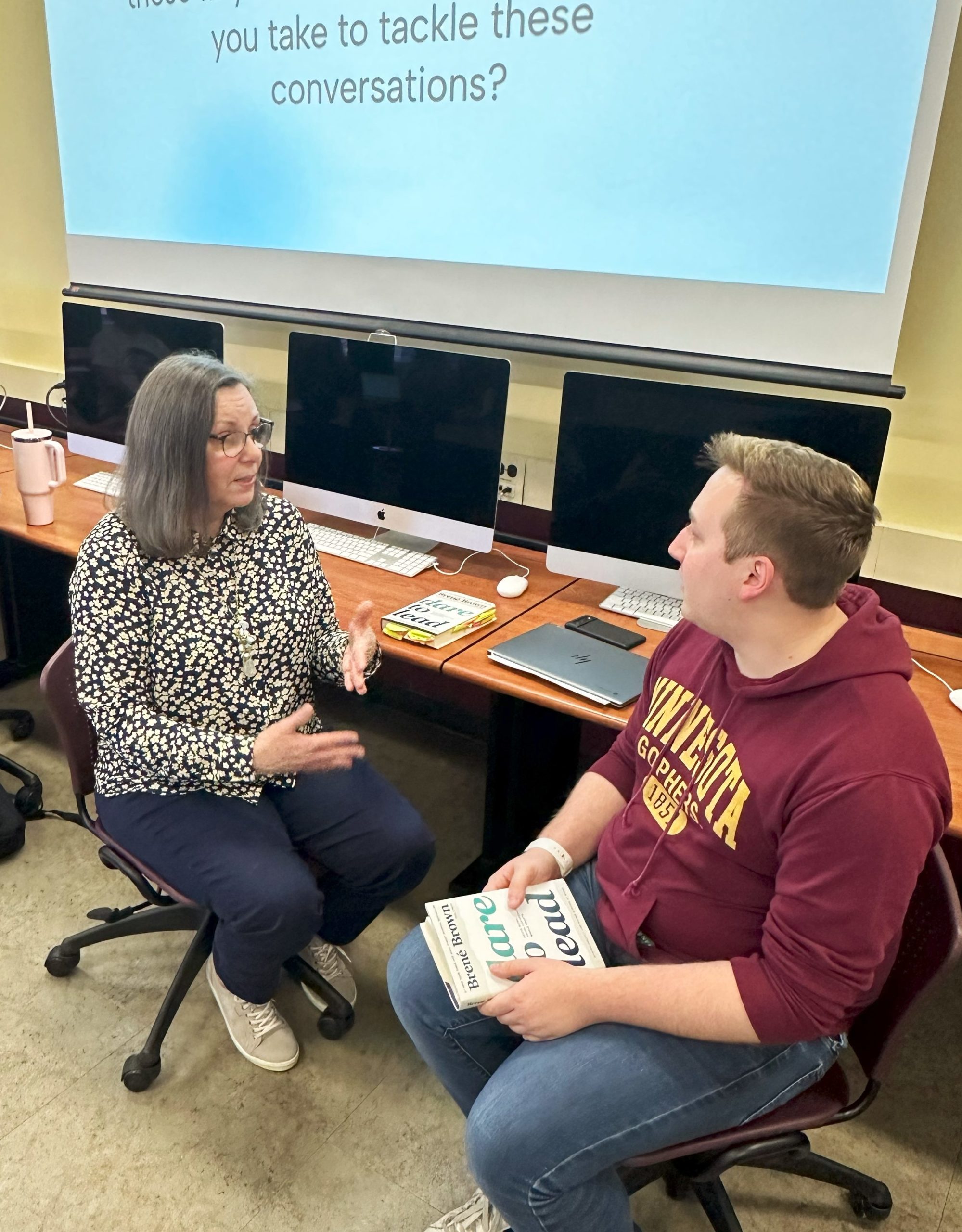
These aims are reinforced by the students’ final two projects, which ask them to create plans for success as future leaders and writers in corporate environments. Each student reflects on the course in a letter, in which they articulate their intentions as young writers entering a fast-changing workforce.
A Partnership Built on Past Experiences
Dr. Morris brings real-world corporate experience and over twenty years of teaching experience to her classroom. This is her second time teaching WRA 333 as well as collaborating with Voss; last fall, the duo co-taught WRA 370, an introductory course in grammar and editing.
As an undergraduate at the University of Minnesota, Voss’ two favorite courses were “Technical and Professional Writing” and “Editing, Critique, and Style.” In addition to sharing relevant knowledge from his undergraduate years, Voss offers his perspectives as a young adult and current student to connect with undergraduates in WRA 331, many of whom are seniors.
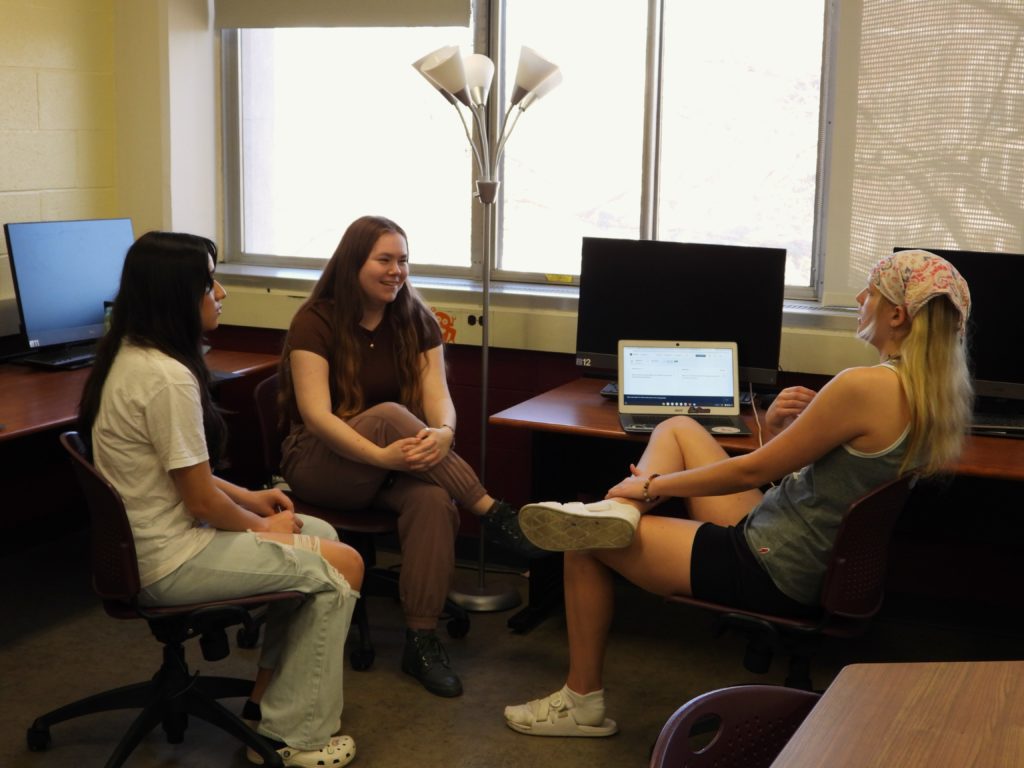
“I was in their position not too long ago, so I’m often asking: ‘How can we prepare these students to launch into the next phase of life?’” Voss said.
As a former writer in a corporate setting, Dr. Morris also understands the particular nature of corporate environments that many of her students will enter after graduating this spring.
“When students get to the workplace, they’re going to be writing a lot,” Dr. Morris said. “In a corporate setting, you have to be in good relationships with people across the organization, so you can gather the information you need and write it up in a way that meets the needs and expectations of your audience.”
In anticipation of these demands, Dr. Morris and Voss ask their students to write across different modes of writing while attending closely to their audiences, which involves analysis and research to better understand the needs of hypothetical readers. In the classroom, peers function as readers and supporters, so Dr. Morris and Voss strive to foster a communal space where students feel comfortable sharing, brainstorming, and writing together.
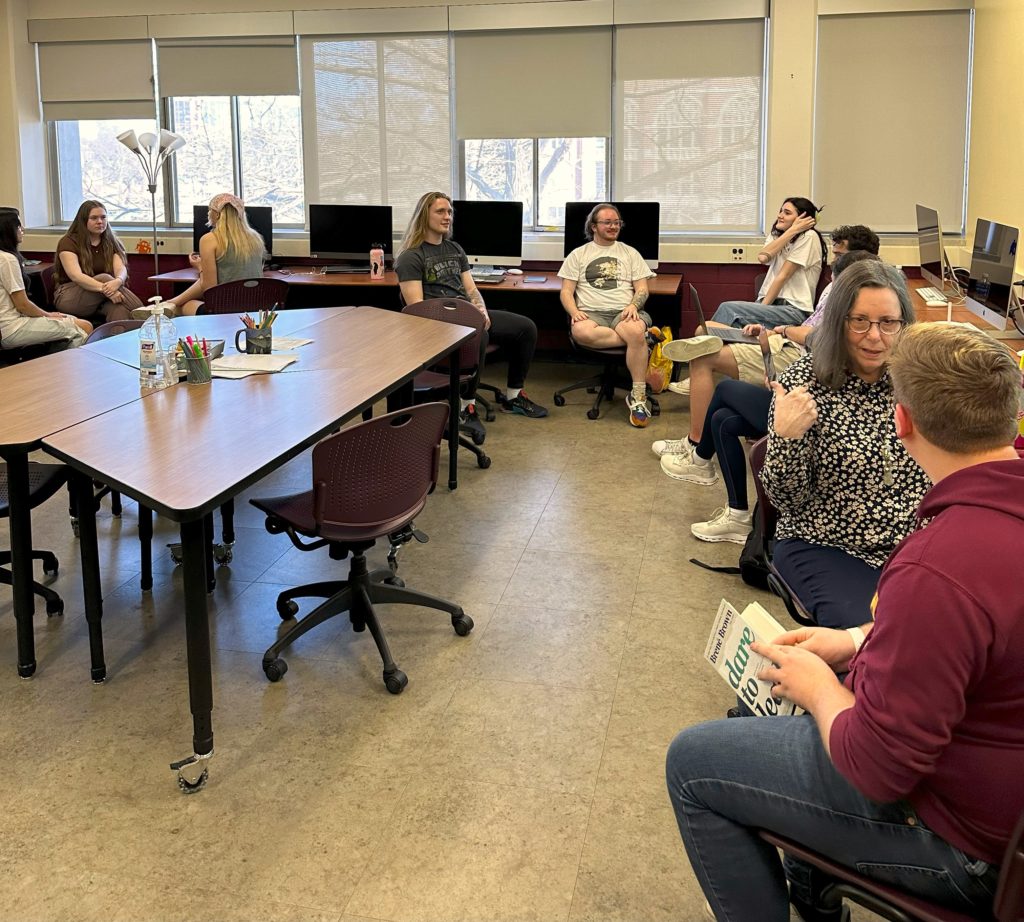
“One of my primary aims as a P2W Professor is to create a small community in every classroom where people really know each other, their strengths and weaknesses, and trust in the process of sharing their writing,” Dr. Morris said.
Intentional community-building is especially vital in classrooms with varied academic interests. In WRA 333 alone, represented majors include Neuroscience, Textile and Apparel, Japanese, Communications, Political Science and Theory, and Experience Architecture. Students often enroll in P2W courses like WRA 333 to fulfill requirements for the MiW or complete a writing elective, so P2W faculty – and teaching assistants like Voss – work with students from diverse backgrounds.
By getting to know these students “on a more granular level,” Dr. Morris said, she can tailor their activities and teams to align with their educational goals and personal needs. “Every class, we check in and try to be honest with each other. We share a lot of laughter, and then we forge forward.”
Co-Teaching = Co-Learning
Collaborating with Voss – who will complete his MA in Rhetoric and Writing this spring and begin a Ph.D. program next fall – “lets me perceive new ways to come into the classroom and infuse it with life and knowledge,” Dr. Morris reflected. She attributes the success of their collaboration to shared pedagogical values, enthusiasm, and overall “synergy.”
“Ethan and I have complementary values of building community, listening to students, and centering students in our pedagogy,” Dr. Morris described. She contends that the students in WRA 333 also benefit from their collaboration, as they get to work with both a long-time professor and former corporate professional and a younger educator with newer theory and praxis.
Both Dr. Morris and Voss bring their enthusiasm for relationship-building via writing, as well as their shared belief in the value of pedagogical partnerships in higher education. “In teaching settings, there’s so much value in observation, but even more in the process of actively engaging your ideas and putting them into practice,” Dr. Morris said. “Most of the time, students are so eager to learn that they’re forgiving about your learning process as a teacher.” It can take years to develop one’s “teacherly identity,” Dr. Morris noted – and she’s still doing it alongside Voss.
Preparing Students for Future Work – and Future Writing
The impending job search can feel daunting for many students, so Voss and Dr. Morris take measures to ground their class in the present moment with supportive check-ins and a “Dumb Question of the Day” – usually supplied by Voss – that imbue the classroom with honesty and a therapeutic dose of humor.
These pedagogical moves support the professional and personal success of undergraduates, as well as Voss’ personal journey as a graduate student. After completing his Ph.D., Voss sees himself teaching in a First-Year Writing Program and eventually working as a Director. From there, he plans to eventually transition into other leadership roles, but always circling back to his original love for higher education, classroom community, and the students who define this work.
In this specific course and across his pedagogy, Voss views the classroom as a space to gather and “foster the development of genuinely good people: ones who can leave as leaders and understand the importance of engaging with other people, exactly as they are.”
“Regardless of whether they go into a corporate setting or somewhere else, we want students to make genuine changes in the spaces they enter,” Voss said.
Voss and Dr. Morris recently submitted a presentation proposal to talk about their co-teaching experience at the Spring 2024 Teaching and Learning Conference , hosted by the Center for Teaching and Learning Innovation. They look forward to completing the semester together and sharing about their collaboration with a larger community of teachers, researchers, and writers.
WRA 331: Writing in the Public Interest
Across the hall, Murdock and Dr. Straayer teach undergraduates about nonprofit writing in WRA 331. While acknowledging their roles as teachers first, they also wear “the hats of clients, such that students are creating deliverables that would be used in a nonprofit communications strategy or a real community,” Murdock reflected.
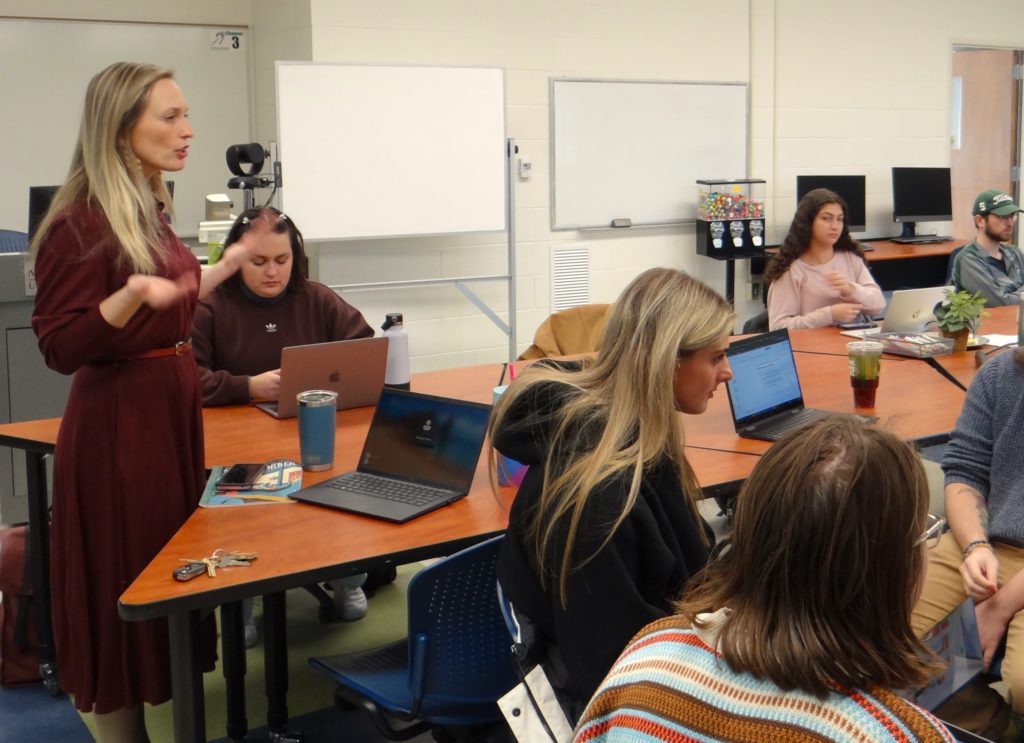
Dr. Straayer offered a similar sentiment. “As a class, we’re really invested in understanding what reading and writing look like in community spaces, and not just in higher education.”
In keeping with this community-centric vision, Dr. Straayer and Murdock incorporate a mixture of projects and learning modalities into WRA 331. Across assignments, they emphasize hands-on creation and thinking about the complexities of writing for nonprofit organizations, especially compared to corporate settings.
The course is structured around five assignments, beginning with an introductory project that asks students to analyze and adjust an example of nonprofit communication with significant room for improvement. Students get a chance to play with design in a low-stakes environment, familiarize themselves with writing in the nonprofit sphere, and “make constructive changes and see what challenges arise in the process,” Dr. Straayer described. Students find that while “it’s easy to critique a writing sample, it’s much harder to make it ‘right,’” she said.
This foundational assignment prepares students for the remaining four projects, which collectively ask them to consider the role of audience, storytelling, and personal values when communicating on behalf of a nonprofit organization. The course simulates the challenges and affordances of writing for nonprofits, whether on a freelance or in-house basis: through case studies, rhetorical analysis of common documents, project management, and ongoing reflection.
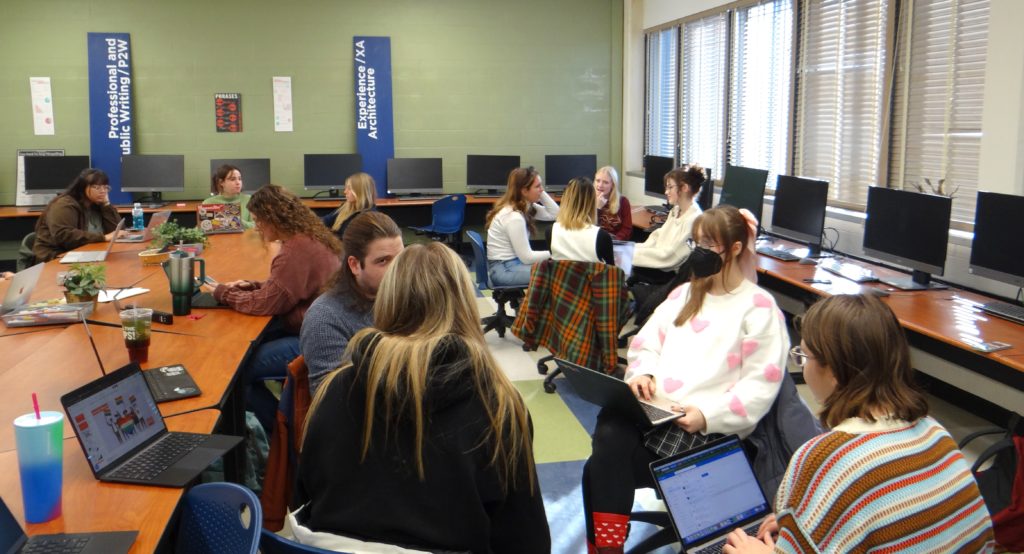
In the students’ third project, which explores the role of storytelling in the nonprofit world, Dr. Straayer asks students to consider the ethics of communicating other people’s stories. “We consider what it looks like to give others agency in the composition practice – because in the nonprofit world, so much of writing is storytelling,” Dr. Straayer said. In this specific project but also throughout the course, Dr. Straayer and Murdock focus on preparing students to enter a nonprofit setting with care and intention.
“We want to prepare students to listen and understand their own positionality and lens through which they view the world, so when they’re working with communities, they understand how to work with a certain kind of sensitivity and thinking,” Dr. Straayer described. “When we tell stories in nonprofit spaces, we want to honor the people we’re working with and show them in the fullness of who they really are, and ensure that we’re not just shedding one light.”
Replicating Community Work in the Writing Classroom
Prior to teaching in WRAC, Dr. Straayer worked for three years at the Literacy Center of West Michigan and oversaw their program for parents learning English. As a graduate student at MSU, Dr. Straayer worked with English Language Learners at Bethany Christian Services; and during the summers, she taught at Grand Rapids Community College as an English Fast Track Instructor. These highly immersive experiences – centered around one-on-one relationships – continue to inform Dr. Straayer’s teaching philosophy in WRA 331.
Dr. Straayer also has ample experience mentoring younger professionals like Murdock, who originally got involved in WRA 331 to fulfill the internship requirement for her MA concentration in Professional Writing and Technical Communication. On a more personal level, Murdock views this internship as an opportunity to expand the definition of teaching, particularly as it relates to her professional interests in nonprofit work.
“Teaching happens everywhere,” Murdock said. “Even though I’m not currently interested in classroom teaching as a career, I find that teaching happens across professional spaces and roles: in nonprofit leadership, project management, even user experience and design work.”
Murdock incorporates various pedagogical tools and experiences from her work in the Cube – a publishing and user experience research center in WRAC – to give undergraduates in WRA 331 an experience she called “workplace-light.”
“When you’re presenting something to a client, explaining ‘here’s what we did, and here’s why,’ or running workshops to get feedback on a prototype – these conversations are pedagogical in a lot of ways,” she said.
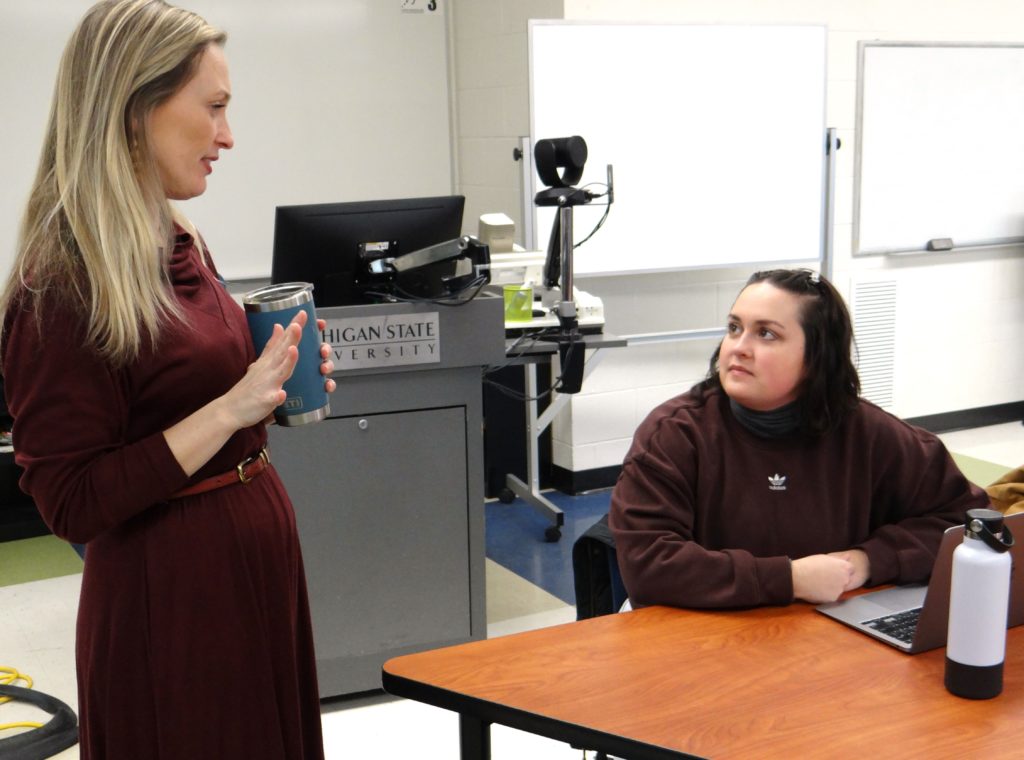
Collaboration, Community, and Cross-Cultural Communication
This Spring semester, the majority of students in WRA 331 are non-writing majors, ranging from Studio Art to Political Science. The course bridges a range of learners and experiences, enhancing the relevance of collaboration and cross-cultural understanding in the classroom.
Outside the classroom, Dr. Straayer and Murdock collaborate regularly to plan for their next class and reflect on the last. “We’re both learning to teach this class for the first time,” Murdock explained. “It’s been really cool to bring my knowledge and experiences to this setting and see students practice project management, especially since undergraduates don’t usually get asked to take on these roles in their classes.”
As she looks forward to graduating in the spring, Murdock is actively applying to communications roles in mission-driven organizations. Reflecting on her development as a writer and professional, she loves helping undergraduates recognize and honor their passions, interests, and abilities. “A lot of this co-teaching experience has involved confidence-building: helping students recognize their own affinities and leverage them for class projects,” Murdock said.
Dr. Straayer plays a parallel supportive role for Murdock and other young professionals. As a former graduate student, Dr. Straayer was recognized for her mentorship of new teaching assistants ; and now, as a working teacher, she maintains her commitment to advising new educators. “I want to help them develop curriculum, see their strengths as teachers, and ultimately lean into what they’re good at and not try to be something they’re not in the classroom,” she shared.
Figuring out “your window into pedagogy” takes time, Dr. Straayer said, but these semester-long collaborations give graduate students like Murdock and Voss the time, space, and community to explore their pedagogical values – and, perhaps most challengingly, how to translate them into structured classroom activities. “How do you funnel all of your teaching values into one moment?” Dr. Straayer mused. “It’s a tough question.”
Dr. Straayer makes time at the end of each day to sit with this question, reflect on what went well in the classroom, and consider which areas might call for revision or more structured collaboration with Murdock or other teachers in the department. “It’s so fun and helpful working with Mary, getting to know the students, seeing their energy, and hearing their discussions,” Dr. Straayer said.
In both WRA 331 and WRA 333, the lines between teacher, learner, and writer are productively blurry – and in these collaborative communities, moments of teaching and learning are always unfolding.
For more information about the MiW, P2W major, and the graduate program in Rhetoric and Writing, please visit the WRAC website .
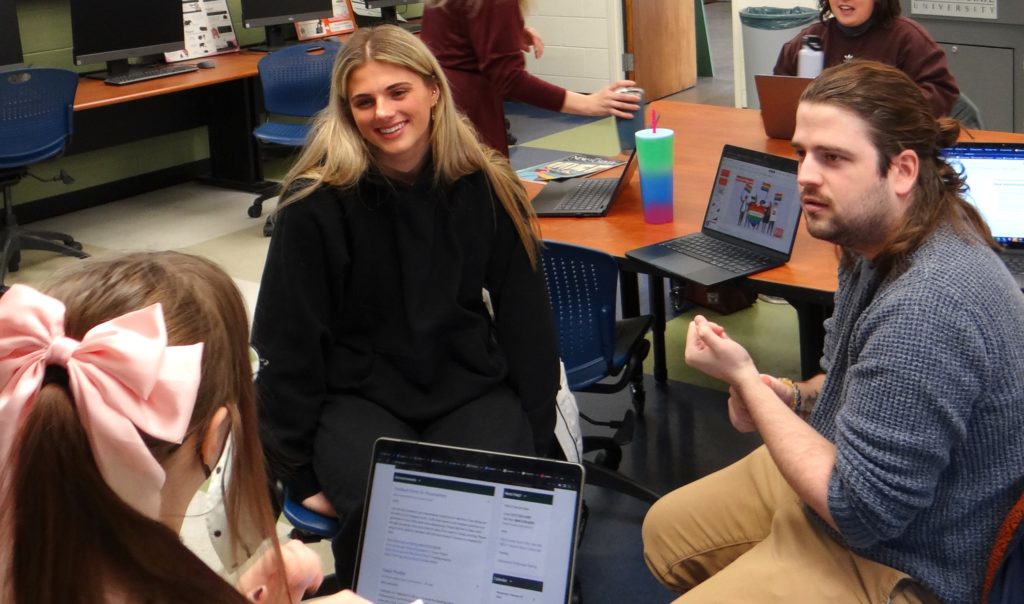
You Might Also Like
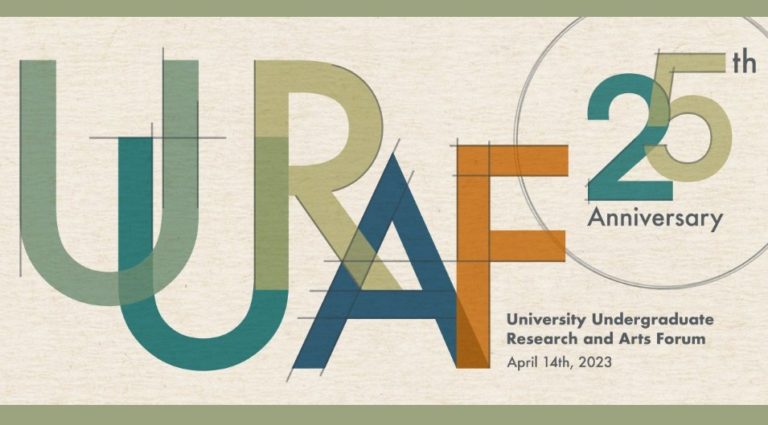
University Undergraduate Research and Arts Forum Set for April 14
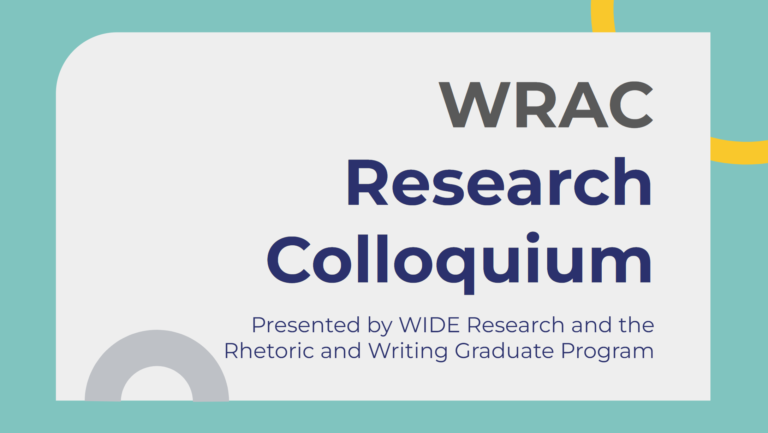
WRAC Research Colloquium 2023
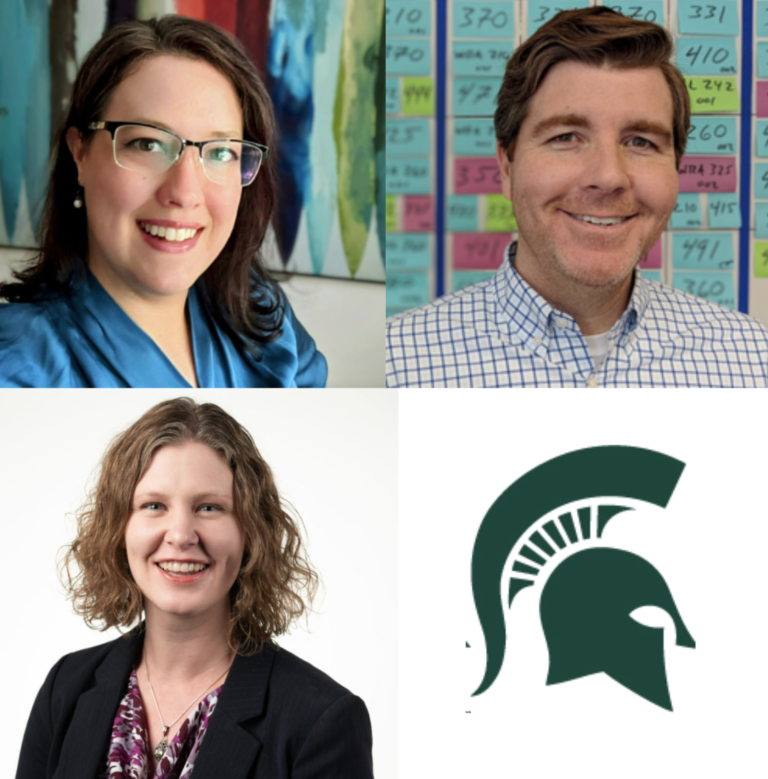
WRAC Recognizes Three New Tenure-Track Faculty
The 2024 Michigan Writing Workshop
Get your writing published: may 4, 2024, the 2024 michigan writing workshop: may 4, 2024.

This writing event is a wonderful opportunity to get intense instruction over the course of one day, pitch a literary agent or editor (optional), get your questions answered, and more. Note that there are limited seats at the event (200 total). All questions about the event regarding schedule, details and registration are answered below. Thank you for your interest in the 2024 Michigan Writing Workshop! We are very proud of our many success stories where attendees sign with agents following events — see our growing list of success stories here .
(Please note that this is an in-person event. We at Writing Day Workshops plan both online/virtual as well as in-person events. This next MWW is an in-person event happening in the Detroit suburbs on May 4, 2024. See you there.)
WHAT IS IT?
This is a special one-day “How to Get Published” writing workshop on Saturday, May 4, 2024, at the Embassy Suites Detroit – Livonia/Novi. In other words, it’s one day full of classes and advice designed to give you the best instruction concerning how to get your writing & books published. We’ll discuss your publishing opportunities today, how to write queries & pitches, how to market yourself and your books, what makes an agent/editor stop reading your manuscript, and more. No matter what you’re writing — fiction or nonfiction — the day’s classes will help point you in the right direction. Writers of all genres are welcome.
This event is designed to squeeze as much into one day of learning as possible. You can ask any questions you like during the classes, and get your specific concerns addressed. We will have literary agents onsite to give feedback and take pitches from writers, as well. This year’s agent and editor faculty so far includes:
- literary agent Chelsea Eberly (Greenhouse Literary)
- literary agent Maggie Sadler (Corvisiero Literary)
- literary agent Kat Kerr (Donald Maass Literary Agency)
- literary agent Jon Michael Darga (Aevitas Creative Management)
- literary agent Cyle Young (CYLE Literary)
- literary agent Rachel Beck (Liza Dawson Associates)
- literary agent Alexandra Grana (Corvisiero Literary)
- literary agent Justin Brouckaert (Aevitas Creative Management)
- literary agent Carrie Howland (Howland Literary)
- and possibly more to come.
By the end of the day, you will have all the tools you need to move forward on your writing journey. This independent event is organized by coordinator Brian Klems of Writing Day Workshops . E-mail him to register for the event at [email protected] and mention you’re specifically interested in the Michigan conference.
EVENT LOCATION & DETAILS:
9:30 a.m. – 5 p.m., Saturday, May 4, 2024 — at the Embassy Suites Detroit – Livonia/Novi, 19525 Victor Parkway, Livonia, MI 48152.

THIS YEAR’S SESSIONS & WORKSHOPS (MAY 4, 2024):
What you see below is a quick layout of the day’s events. The topics below are mostly set, but subject to change. You can see a more detailed layout of the day’s classes on the Schedule Page here .
Please Note: There will be 2-3 classes/workshops going at all times during the day, so you will have your choice of what class you attend at any time. The final schedule of topics is subject to change, but here is the current layout:
8:30 – 9:30: Check-in and registration at the event location.
BLOCK ONE: 9:30 – 10:30
1. Finding Your Voice . In this talk, attendees will learn how to identify your voice, how to deliberately and expertly finesse it, and how the best way to sharpen your voice is to write, write, write!
2. But Do You Really NEED a Literary Agent? — Traditional vs. Self-Publishing (& What Agents Really Do) . What do agents really do for writers? What don’t they do? Can writers just reach out to a publisher on their own? When should writers self-publish?
BLOCK TWO: 10:45 – 11:50
1. Building Your Author Brand & Marketing Plan . This session will share how to create a compelling author brand and the secrets to creating an easy-to-enact book marketing strategy that won’t distract from your writing time.
2 . How to Write Great Chapter Beginnings: The S.P.R.I.N.G.S. Method . Every book/chapter needs a powerful first paragraph to spring the story forward and compel the reader to invest his or her time on reading further. A good opening paragraph drives a story onward, it sets the tone and mood for what follows, and draws the reader deeper.
(What you see here is a quick layout of the day’s events. See a full layout of the day’s sessions, with detailed descriptions, on the official Schedule Page here .)
LUNCH ON YOUR OWN: 11:50 – 1:15
Lunch is on your own during these 85 minutes.
BLOCK THREE: 1:15 – 2:30
1. “Writers Got Talent”—a Page 1 Critique Fest . This is a chance to get your first page read (anonymously — no bylines given) with attending agents commenting on what was liked or not liked about the submission.
2. Nonfiction Book Proposal 101: How to Sell a Nonfiction Book . This session is completely devoted to nonfiction. So if you are trying to create an awesome nonfiction book proposal, this presentation is for you.
BLOCK FOUR: 2:45 – 3:45
1. Open Agent Q&A Panel. Several attending literary agents will open themselves up to open Q&A from MWW attendees. Bring your questions and get them answered in this popular session.
2. What to Expect After the Book Deal —Everything You Need to Know . Congratulations, you’ve sold your book! Now what? From submitting your manuscript for developmental edits to seeing your finished book on the shelf, this session will help demystify what comes after you sign with a publisher.
BLOCK FIVE: 4:00 – 5:00
1. How to Write a Great Query Letter for Your Novel . This workshop is a thorough crash course in writing an awesome query letter. What things should you avoid in query writing? What beginnings are overused and don’t work? How to compose a great pitch? How do you whittle down a long query? This session will cover all those questions and more.
2. Examining the Paths of Successful Authors: Best Strategies Based on Advice of Bestselling Authors and Publicists from Major Publishing Houses . In this workshop, a literary agent will first explore how to define success in the author world, then compare how book sales look today compared to in past decades, along with an analysis of what grassroots efforts authors can undertake in terms of marketing and promotion, and whether they actually move the needle.
SESSIONS END: 5:00
At 5 p.m., the day is done. Speakers may make themselves available by the workshop’s bookstore for a short while to sign any books for attendees.
Agent & Editor Pitching: All throughout the day.
————-
PITCH AN AGENT OR EDITOR:

ADDED ONLINE PITCHING : To ensure that writers have a robust and diverse lineup of agents & editors to pitch, 2024 Michigan Writing Workshop attendees will have the ability to also pitch literary agents at the Writing Day Workshops *online* event that follows the 2024 MWW on our calendar.
That event is the Pittsburgh Writing Workshop , May 31 – June 1, 2024, which will have 30-40 agents taking one-on-one Zoom virtual pitches.
This means that 2024 MWW attendees can have access to pitching all those online PWW agents — pitches still at $29 each — without being a formal registrant for the online May/June 2024 event. (That said, if you want to formally register for the Pittsburgh conference and have access to all classes and panels, let us know, as there is a discount for confirmed Michigan attendees.)
If you are interested in this added pitching opportunity, the first step is to get formally registered for Michigan. Following the MWW conference on May 4, 2024, we will be in touch with all Michigan attendees and ask them if they want to partake in pitching online agents at the 2024 PWW (May 31 – June 1) . At that time, you can communicate your pitch requests and purchase meeting time.
More 2024 agents to be announced as they are confirmed. You can sign up for pitches at any time, or switch pitches at any time, so long as the agent in question still has appointments open.
These one-on-one meetings are an amazing chance to pitch your book face-to-face with an agent, and get personal, individual feedback on your pitch/concept. If the agent likes your pitch, they’ll request to see part/all of your book — sending you straight past the slush pile. It also gives you an intimate chance to meet with an agent and pick their brain with any questions on your mind.
(Please note that Agent/Editor Pitching is an add-on, separate aspect of the day, for only those who sign up. Spaces are limited for these premium meetings, and pricing/detail is explained below.)
———
$199 — EARLY BIRD base price for registration to the 2024 MWW and access to all workshops, all day. As of fall 2023, registration is now OPEN.
Add $29 — to secure a 10-minute one-on-one meeting with any of our literary agents or editors in attendance. Use this special meeting as a chance to pitch your work and get professional feedback on your pitch. (Spaces limited.) If they wish, attendees are free to sign up for multiple 10-minute pitch sessions at $29/session — pitching multiple individuals, or securing 20 minutes to pitch one person rather than the usual 10. Here are four quick testimonials regarding writers who have signed with literary agents after pitching them at prior Writing Day Workshops events. (Our bigger, growing list of success stories an be seen here .)

Add $69 — for an in-depth, personal critique of your one-page query letter from Brian Klems, one of the day’s instructors. (This rate is a special event value for Michigan Writing Workshop attendees only.) Registrants are encouraged to take advantage of the specially-priced critique, so they can send out their query letter with confidence following the workshop. Also, if you are meeting with an agent at the event, you’re essentially speaking your query letter aloud to them. Wouldn’t it be wise to give that query letter (i.e., your pitch) one great edit before that meeting?
Add $89 — for an in-depth personal critique of the first 10 pages of your novel. Spaces with faculty for these critiques are very limited, and participating attendees will either 1) get an in-person meeting at the workshop, if the faculty member is attending the live event, or 2) get a 10-minute phone call with the faculty member, and have notes passed along via email, if the critiquer is not attending the live event. Options:
- Historical fiction, literary fiction and women’s fiction, and creative nonfiction essays (in-person critiques): Faculty member Lynne Golodner , an author and marketing entrepreneur, will get your work in advance, critique the first 10 double-spaced pages of your book, meet with you in person on May 4 at the MWW — for 15 minutes at the workshop to discuss her thoughts, and pass along written critique notes before or after the meeting.
- Women’s fiction, contemporary/mainstream fiction, literary fiction, young adult, and memoir (virtual critiques) : Faculty member Kimiko Nakamura , a literary agent and writing coach, will get your work in advance, critique the first 10 double-spaced pages of your book, meet with you online (Zoom, etc.) or by phone for 15 minutes sometime before the workshop to discuss her thoughts, and pass along written critique notes before or after the meeting.
- Children’s picture books and middle grade (virtual critiques) : Faculty member Brittany Thurman , a published author, will get your work in advance, critique the first 10 double-spaced pages of your book, meet with you online (Zoom, etc.) or by phone for 15 minutes sometime before the workshop to discuss her thoughts, and pass along written critique notes before or after the meeting. If you submit a picture book, it must be 1,000 words or fewer (can have illustrations or not).
- Commercial women’s fiction, thriller/suspense, thriller with romantic elements, cozy mystery, YA thriller, young adult in general, middle-grade, literary fiction, and fantasy (virtual critiques) : Faculty member Amberly Finarelli , a former literary agent and current writing coach, will get your work in advance, critique the first 10 double-spaced pages of your book, meet with you online (Zoom, etc.) or by phone for 15 minutes sometime before the workshop to discuss her thoughts, and pass along written critique notes before or after the meeting.
- Science fiction, fantasy, romance, horror, young adult SFF, urban fantasy (virtual critiques) : Faculty member Wesley Chu , a published novelist, will get your work in advance, critique the first 10 double-spaced pages of your book, meet with you online (Zoom, etc.) or by phone for 15 minutes sometime before the workshop to discuss his thoughts, and pass along written critique notes before or after the meeting.
- More critique options possibly forthcoming
How to pay/register — Registration is now open. Reach out to workshop organizer Brian Klems via email: [email protected] , and he will provide specific instructions for payment and registration to get you a reserved seat at the event. Payment is by credit card, PayPal, or check. Because Brian plans different workshops, make sure you note that you’re inquiring about the Michigan workshop specifically.
REGISTRATION:
Because of limited space at the venue (Embassy Suites Detroit – Livonia/Novi), the workshop can only allow 200 registrants, unless spacing issues change. For this reason, we encourage you to book sooner rather than later.
Are spaces still available? Yes, we still have spaces available. We will announce RIGHT HERE, at this point on this web page, when all spaces are taken. If you do not see a note right here saying how all spaces are booked, then yes, we still have room, and you are encouraged to register.
How to Register : The easy first step is simply to reach out to workshop organizer Brian Klems via email: [email protected] . Brian will pass along registration information to you, and give instructions on how to pay by credit card, PayPal, or check. Once payment is complete, you will have a reserved seat at the event. The MWW will send out periodic e-mail updates to all registered attendees with any & all news about the event. Because Brian plans different workshops, make sure you note that you’re inquiring about the Michigan workshop specifically.
Refunds : If you sign up for the event and have to cancel for any reason at any time, you will receive 50% of your total payment back [sent by check or PayPal]. The other 50% is nonrefundable and will not be returned, and helps the workshop ensure that only those truly interested in the limited spacing sign up for the event. (Please note that query editing payments and manuscript editing payments are completely non-refundable if the instructor has already edited your work.)

Get to Know an Agent in Attendance: Rachel Beck of Liza Dawson Associates

Rachel joined Liza Dawson Associates in 2020 after working at a boutique literary agency for four years. She has been in the publishing industry since 2009 and worked at Harlequin editing romance novels for nearly six years before transitioning her skills to the agent world in order to be an advocate and champion for authors. She lives outside of Pittsburgh with her husband, three young children, and an endlessly entertaining cat. Rachel is looking for:
- Upmarket/book club women’s fiction: Books that remind us how difficult it is to be a modern woman, but also how rich and rewarding—controversial or morally gray topics welcome
- Smart contemporary romance/romcoms: Beach reads, but with plenty of heart and heft; books that make you go from laughing to crying in an instant—think Kristan Higgins or Emily Henry
- Historical fiction this side of World War II: Dual timelines welcome
- Sweeping, multigenerational family sagas like Memphis or Malibu Rising
- Speculative fiction
- Thrillers/domestic suspense: Character-driven, psychologically intense reads; love a good classic antihero
- Contemporary YA: Especially LGBTQIA+ stories and “issue” books on what teens face today, from climate change to mass shootings to social media pressures
- Select nonfiction: Narrative, gifty/pop culture, cultural criticism, politics, career/personal growth, self-help, health/wellness, sports, parenting
Get to Know an Agent in Attendance: Carrie Howland of Howland Literary

Carrie holds a B.A. in English and Creative Writing from Albion College, where she was the Poetry Editor of The Albion Review. Her poetry has appeared in various literary journals and magazines. In her spare time, Carrie volunteers as a foster for a local dog rescue and is an active member of the Junior League. Her passions include music, pop culture, and the Midwest. She has been featured in several publications discussing her work as an agent including Poets & Writers, SCWBI insight, Akashic Books, and Slice Magazine. Carrie Howland joined Empire Literary after eleven years as an agent at Donadio & Olson, Inc.
She represents young adult, middle grade, and select picture book authors.
Get to Know an Agent in Attendance: Justin Brouckaert of Aevitas Creative Management

Justin is a Metro Detroit native who holds an MFA in fiction from the University of South Carolina, where he was a James Dickey Fellow. As an agent, he is interested in memoir, and narrative nonfiction.
In nonfiction, he is most interested in memoirs that offer access to exclusive places and experiences, as well as reported narratives that shed light on under-represented people and communities.
Get to Know an Agent in Attendance: Alexandra Grana of Corvisiero Literary

Alex is a recent graduate of the University of Toledo College of Law. She has always loved writing and literature, having completed her B.A. in Professional Writing at Miami University, and is excited to dedicate herself to helping fellow writers pursue publication. When she isn’t reading, she can be found trying a new recipe in the kitchen or prepping for her next DnD session.
Alex’s favorite genres are fantasy and horror. She is a sucker for a good magic system, reimagined fairy tales, and poetic prose. Stories by marginalized writers are of particular interest to her.
In fiction, she seeks:
- Science Fiction, Fantasy, and Horror for middle grade, young adult, and adult
- LGBTQ stories in all genres
- Mysteries and Thrillers
- Historical fiction
- Magical Realism
- Weird Queer
In adult, new adult, and young adult, Alex enjoys:
- Lush gothic stories of all kinds
- Feral girl protagonists
- Wintery fantasies, with a soft spot for Slavic-inspired settings and dog sledding
- Fantasies set in space and dark, grounded science fiction
- Solarpunk science fiction
- Body horror with religious themes
In middle grade, Alex hopes to find:
- Scary stories that keep you up at night
- Themes of self discovery and found family
- Fantasies reminiscent of Spirited Away
In nonfiction, Alex Is looking for:
- Occult History/Mysteries
- Narratives about Deconstruction
Books Alex loves:
Lilith’s Brood by Octavia Butler The Bear and the Nightingale by Katherine Arden House of Hunger by Alexis Henderson House of Leaves by Mark Z. Danielewski The Echo Wife by Sarah Gailey
Get to Know an Agent in Attendance: Kat Kerr of Donald Maass Literary

Kat joined Donald Maass Literary Agency in 2019. She graduated from Florida State University with a Bachelors in English in 2009 and is drawn to literary and commercial voices within the adult and YA markets, as well as adult nonfiction. Kat feels strongly about supporting programs like We Need Diverse Books and is passionate about creating space in this industry for those from historically marginalized communities. She is actively seeking to grow her client list and is particularly hungry for magical realism, literary leaning speculative and science fiction, women’s fiction, YA works with a lot of heart, and narrative nonfiction with something to say.
Submission Interests:
Literary and Upmarket Fiction:
Kat is drawn to strong, character-driven works with rich, literary prose. She loves books that make her think and have a strong emotional pull.
Contemporary Women’s Fiction Multicultural Lit Speculative Magical Realism Family Sagas YA
Favorite Books: Wide Sargasso Sea by Jean Rhys, Big Fish by Daniel Wallace, About a Boy by Nick Hornby, Song of Solomon by Toni Morrison, The Leavers by Lisa Ko, Like Water for Chocolate by Laura Esquivel, Pachinko by Min Jin Lee, The Henna Artist by Alka Joshi, More Happy Than Not by Adam Silvera, Here and Now and Then by Mike Chen, anything by Amy Tan
Commercial Fiction:
For the commercial market, Kat is looking for high concept, voice-driven works with a close POV and well-developed, distinct characters.
Select Science Fiction and Fantasy Women’s Fiction and Rom-Coms YA (all genres)
Favorite Books: The Hate U Give by Angie Thomas, Shades of Magic series by V.E. Schwab, The Devil Wears Prada by Lauren Weisberger, Wicked: The Life and Times of the Wicked Witch of the West by Gregory Maguire, Crazy Rich Asians trilogy by Kevin Kwan, The Kiss Quotien t by Helen Hoang, The Sound of Stars by Alechia Dow, Wild Women and the Blues by Denny S. Bryce, I’ll Be the One by Lyla Lee
Nonfiction:
Narrative nonfiction and journalistic non-fiction tackling current affairs and social justice issues, particularly covering topics of racism, immigration, LGBTQIA+ rights, gender equality, and poverty Select biographies and memoirs
Do NOT pitch:
– Plots/themes centering around unresolved trauma – Previously published or self-published works – MG, Chapter books, picture books – Novellas, short stories, or poetry collections – Military/war stories – Westerns
Get to Know an Agent in Attendance: Chelsea Eberly of Greenhouse Literary Agency

She represents authors of middle grade, young adult, graphic novels, and women’s fiction, as well as illustrators who write picture books.
As a former Senior Editor at Random House, she edited the Newbery Medal winning When You Trap a Tiger by Tae Keller as well as numerous award-winning and New York Times bestselling authors such as Tamora Pierce, Leigh Bardugo, Marie Lu, Sarah J. Maas, Mark Siegel, and Kim Johnson to name only a few. She has a deep understanding of how publishers think and is an expert advocate for her clients. Chelsea is also a Publishers Weekly Star Watch Honoree, which recognizes “the rising stars of the US publishing industry.”
Get to Know an Agent in Attendance: Maggie Sadler of Corvisiero Literary

Maggie earned her joint Masters with honors in Comparative Literature and English from the historic University of St Andrews and her Masters in Literary Studies from Memorial University of Newfoundland, where her literary interests ranged from folklore retellings to nineteenth-century maritime adventure fiction, and interrogating audience reception across creative mediums. Outside of the agency space, Maggie also works as an editor and writing coach. Maggie marries these complimentary experiences with an intentional, intelligent, and growth-minded approach as a literary agent.
Maggie primarily seeks literary and upmarket adult fiction with distinct character voices, lyrical prose, and propulsive plots. She loves books that unapologetically challenge and deconstruct genre, narrative, or structural conventions—books that take risks. She appreciates a careful, restrained hand with fabulist elements, one that gently asks the reader to reconsider the boundary between the real and the fantastic. Above all, Maggie craves stylish writing and wholly unique concepts that leave her feeling devastated over the palpable talent.
She is seeking:
- Literary fiction written in lyrical, artful prose with carefully crafted tension
- Literary fiction with speculative flavors—let’s get weird
- Upmarket fiction, especially with emotionally complex characters who explore evocative settings
- Untold and/or underrepresented historical fiction (pre-twentieth century, please)
- Urban Fantasy/Magical Realism rooted in our reality
- Folk and fairy tale retellings—the more stunning the twist, the better
- Work from Indigenous/First Nations authors, as well as other historically marginalized and underrepresented voices
- Narratives that interrogate themes of cultural identity, femininity, family legacy, rebellion against tradition, and self-discovery from a fresh, unorthodox perspective
An experienced traveler, Maggie also welcomes nonfiction travel narratives depicting remote locations and thought-provoking encounters in a raw, authentic, and intentional narrative voice.
Maggie is not looking to acquire high fantasy, hard sci-fi, commercial romance, or children’s books at this time.
Maggie would love to discover the next…
- Poet turned prose writer
- Folklore retelling of ambitious, perhaps even monstrous, women who are willing to sacrifice love for power
- An eerie, evocative Gothic setting à la Wuthering Heights
- Endearing and cozy upmarket fiction with the gentlest touch of magic, one that strikes the same notes, atmospherically, as Ghibli’s Howl’s Moving Castle
Get to Know an Agent in Attendance: Cyle Young of Hartline Literary

Cyle is seeking:
- YA, middle grade, and chapter books
- genre fiction, especially romance
- love stories
- speculative (sci-fi and fantasy)
- easy readers, picture books and board books
- nonfiction (parenting, leadership, ministry, and self-help)
- movie and screenplays (specific details at cyleyoung.com)
Cyle is a multiple-genre award-winning author. Winner of more than twenty writing awards, he considers himself a “binge writer” and routinely scribes 30,000 words in a weekend. His book Belly Buttons and Broken Hearts released with Lighthouse Publishing of the Carolinas in 2013.
Cyle finds great joy in writing and loves to bounce between crafting epic high fantasy tales, helpful non-fiction parenting books, and getting lost in the melodic rhythm of children’s poetry. He serves as managing editor of almostanauthor.com , a website devoted to helping aspiring writers become published authors, and is also a monthly contributor to the parenting website, just18summers.com , and the writing website, thewriteconversation.blogspot.com .
You can learn more about what genres Cyle is aquiring by visiting his website at cyleyoung.com .
Get to Know an Agent in Attendance: Jon Michael Darga of Aevitas Creative Management

Jon represents titles across a diverse range of genres, including, most recently, the biography Vivian Maier Developed by Ann Marks, the cookbook Cookies: The New Classics by Jesse Szewczyk (named a Best Cookbook of 2021 by the New York Times ), the photography book Portrait of an Artist by Hugo Huerta Marin, and the New York Times bestselling oral history of “Grey’s Anatomy” How to Save a Life by Lynette Rice.
Darga graduated from the University of Michigan with Honors with a BA in English and Creative Writing, and later attended the Columbia University publishing program. Before coming to Aevitas, he was an editor at Crown, a division within Penguin Random House, where he worked on several bestsellers and award winners.
Darga represents both nonfiction and fiction. He is most interested in voice-driven pop culture writing, non-fiction histories that re-cast the narrative by emphasizing unexpected or unheard voices, and both adult and young adult commercial fiction that features diverse casts and new stories. He is not looking for genre fiction like political/crime thrillers, fantasy/sci-fi, or nonfiction in the self-help/how-to/business categories.
Informal Creative Writing for Adults
Upcoming dates
- Monday, April 8, 2024, 4 - 5 PM
- Monday, April 15, 2024, 4 - 5 PM
- Monday, April 22, 2024, 4 - 5 PM
- Monday, April 29, 2024, 4 - 5 PM

This is an informal creative writing workshop for adults . Writing prompts will be provided at the beginning of the 1 hour program to help your ideas to flow. But you may start writing with your own prompt or own creative idea(s). This will be a space for all writing levels to come together to peacefully write and share ideas, ask for feedback, etc. Writing materials will be provided. Please be aware this is not an instructional program. Please view flyer for more information. Thank you.
- Audience: Adults, 50+
.css-s5s6ko{margin-right:42px;color:#F5F4F3;}@media (max-width: 1120px){.css-s5s6ko{margin-right:12px;}} Join us: Learn how to build a trusted AI strategy to support your company's intelligent transformation, featuring Forrester .css-1ixh9fn{display:inline-block;}@media (max-width: 480px){.css-1ixh9fn{display:block;margin-top:12px;}} .css-1uaoevr-heading-6{font-size:14px;line-height:24px;font-weight:500;-webkit-text-decoration:underline;text-decoration:underline;color:#F5F4F3;}.css-1uaoevr-heading-6:hover{color:#F5F4F3;} .css-ora5nu-heading-6{display:-webkit-box;display:-webkit-flex;display:-ms-flexbox;display:flex;-webkit-align-items:center;-webkit-box-align:center;-ms-flex-align:center;align-items:center;-webkit-box-pack:start;-ms-flex-pack:start;-webkit-justify-content:flex-start;justify-content:flex-start;color:#0D0E10;-webkit-transition:all 0.3s;transition:all 0.3s;position:relative;font-size:16px;line-height:28px;padding:0;font-size:14px;line-height:24px;font-weight:500;-webkit-text-decoration:underline;text-decoration:underline;color:#F5F4F3;}.css-ora5nu-heading-6:hover{border-bottom:0;color:#CD4848;}.css-ora5nu-heading-6:hover path{fill:#CD4848;}.css-ora5nu-heading-6:hover div{border-color:#CD4848;}.css-ora5nu-heading-6:hover div:before{border-left-color:#CD4848;}.css-ora5nu-heading-6:active{border-bottom:0;background-color:#EBE8E8;color:#0D0E10;}.css-ora5nu-heading-6:active path{fill:#0D0E10;}.css-ora5nu-heading-6:active div{border-color:#0D0E10;}.css-ora5nu-heading-6:active div:before{border-left-color:#0D0E10;}.css-ora5nu-heading-6:hover{color:#F5F4F3;} Register now .css-1k6cidy{width:11px;height:11px;margin-left:8px;}.css-1k6cidy path{fill:currentColor;}
- Project planning |
- The complete guide to writing creative ...
The complete guide to writing creative briefs

Just like any other task, creative work deserves a clear plan and measurable goals before work begins. That’s where a creative brief comes in. Developing a creative brief allows you to take a proactive approach and outline requirements while planning out your creative work. Among other important elements, your creative brief is your opportunity to define the scope, deadlines, and deliverables specific to the creative part of your project.
Overall, a creative brief helps keep everyone on the same page—reducing feelings of frustration or confusion—while making sure no part of the design process is bottlenecked.
What is a creative brief?
A creative brief is used to define any relevant creative requirements, including messaging, audience, and outlining how success will be measured. Once the brief is created, plan to host a kickoff meeting to discuss conflicts or restrictions. That way, you have time to revise and update your creative brief before the work begins.
Remember this—creative briefs aren’t meant to be written and then left stagnant. Before your work begins, your creative brief should be an ever-evolving document that may change as the creative requirements continue to be scoped or tweaked. However, by the time the work starts, your creative brief should be a clear plan and have specific goals that your design, content, and creative teams can refer back to throughout the process, making sure everyone is aligned and making the right decisions.
Essential elements of a creative brief
Understanding what a creative brief is and why you need one is important. However, knowing what to actually put in one will save you significant time and reduce back and forths with your creative team. You can avoid having to circle back to questions and conflicts down the road by putting the appropriate information in your creative brief up front.
Take a look at these “must-haves” for every creative brief. Whether you’re planning a marketing campaign, writing a creative brief for an advertising agency, or preparing a creative brief for your internal team, these nine steps will help you clarify the key information your team needs for success. Keep in mind that your brief may contain more elements—and you can certainly add them as they relate to your work—but the criteria mentioned below should be part of nearly every creative brief.
Title and description
Goals and objectives, messaging and tone, assets and deliverables.
Stakeholders
Distribution process
First, give your creative brief a title. Provide a short description of the creative work so team members understand why they are a part of it. Let them know the intention of the creative work.
Title: Advertising campaign for new product launch
Description: As we prepare to launch Apollo Enterprises newest product, we’ll be putting together a series of advertisements to introduce it to the market.
Why are you working on this? At this point in your creative brief, you want to define the specific business need and what the work will accomplish. What does success look like for this particular body of work? As you’re writing down your goals, make sure they are measurable. At the end of the project, you’ll want to look back on them and clearly know if you’ve met your objectives.
Goals and objectives: Reach 500,000 potential customers via paid search over a one-month period and add 5,000 new subscribers to our email list.
Outlining your target audience will help better tailor your creative to them. Look for specific insights, as those become your gems of valuable information. Get clear on who will be consuming your deliverable (video, ad, etc.). Try your best to define what that person looks like by outlining demographics such as age, gender, income level, marital status, or education level.
Also note what your audience values, along with their interests, wants, and needs. State if you’re trying to reach current customers or potential ones. Answering as many questions as possible about what your audience looks like will help you and your team along the way.
Audience: Men, 30-65, mid-high income, at least a high school diploma. They value time outdoors, working with their hands, tools, and gadgets. They’re not current Apollo Enterprises’ customers.
Now that you know who your audience is, you need to clearly establish what messaging you want to put in front of them. Also, when your target market receives that message, what should they think, feel, want, and do? Are you asking them to take an action?
If you already have brand guidelines be sure to include them in your creative brief, or direct stakeholders on where to find them. Following brand guidelines ensures the tone and voice of your messaging matches that of your overall brand, and keeps your messaging consistent across marketing initiatives.
If you don’t have established brand guidelines, work with the right team members to put together some information about the tone and voice that this particular creative work should follow. Think of your message as a person. It should have a voice (a personality) and a tone (a mood or attitude).
Messaging and tone: We want to empower our audience to be creators and use Apollo Enterprises’ new product as part of their most valued suite of tools. We should celebrate the target audience for working with their hands and make them feel proud of their creations.
Since your team’s work will produce some sort of creative asset (or many), this part of your brief should describe what those assets and deliverables are. For example, if you’re creating an advertisement, the final deliverable would be the actual ad. Make sure you specify asset requirements such as dimensions, number of versions, and design elements.
Assets and deliverables: Three different advertisements, each with a different tagline and image (one version for each of the following sizes: 250x250, 728x90, 120x600).
Creative work usually requires cross-functional team collaboration . Marketing and design are almost always involved, and oftentimes other departments will also play a part. This means several individuals from different teams working together on the same desired outcome.
This is why it’s so important to identify all important stakeholders upfront. Each team member should know who is involved and what they’re responsible for. You’ll save yourself a lot of time fielding questions down the line if you add this to your creative brief.
Stakeholders:
Creative team: Larry (ad copy), Emma (ad design)
Marketing team: Hannah (team lead), Caleb (email marketing setup for campaign), Terry (ad distribution)
Product team: Zach (Product Manager)
Establishing your budget from the start will help you actually stay in line financially and guide your decision-making. Be sure you write down actual numbers and identify costs where you can. Conducting some quick research ahead of time will help. Are there ways you can cut some costs? Giving yourself some time to play with the numbers before you even begin the work will keep you in good graces with your boss!
Budget: The overall budget is $8,000 with $5,000 going to ad spend, $1,500 to design, and $1,500 to copywriting.
Establishing a timeline for your work early on will keep you and your team on track. Decide on a start date and end date, and then fill in as many important dates as you can in between. Knowing the important deadlines from the beginning gives all stakeholders an idea of how long their part of the work will take. They can plan accordingly and let you know of any conflicts. Be as specific as you can with dates and deadlines, and keep in mind that adjustments may need to be made as the work progresses.
Kickoff meeting: May 5
Final creative brief due: May 10
Ad copy due: May 30
Ad designs due: June 10
Ad buy plans due: June 15
Ads are live: July 1 - July 31
Measure ad success: Ongoing
Wrap-up: August 15
Identifying how your media assets will actually get to your audience is a part of your creative brief that can’t be skipped. All the hard work you put into every other step of your creative process culminates with an effective distribution strategy. In other words, how will you communicate your message? Social media, email, blog posts, and paid advertisements are just a few ways to distribute your media.
Distribution process: Google Adwords platform to deploy ads.
Creative brief example
Seeing examples of what great creative briefs actually look like can help you formulate your own. Check out this stellar example and pay close attention to the details. You can tell that the project manager took time and thought to develop this creative brief, and help their team work together smoothly.
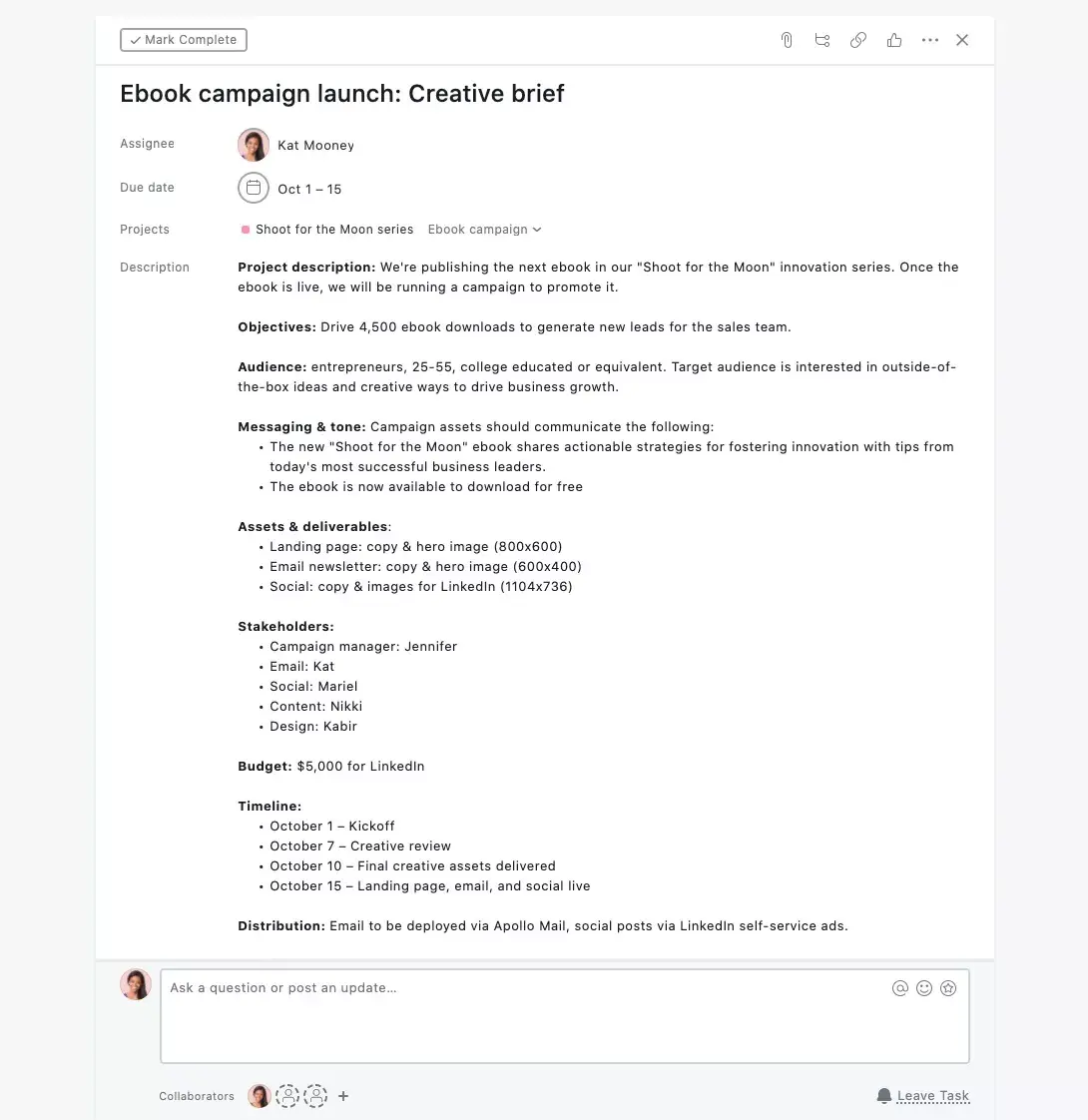
Creative brief template
Get started with this creative brief template to outline your campaign goals, creative deliverables, due date, marketing strategy, and more.
Title and description:
A clear name that your stakeholders can easily identify, and a short summary that conveys the intention of your creative brief.
Goals and objectives:
Define the metrics of success for your creative brief.
Who are you targeting in your campaign and what are their values, interests, and needs? This section should include any relevant demographics.
Messaging and tone:
What type of tone are you trying to strike? How do you want your audience to feel when they see your creative assets?
Assets and deliverables:
Asset and deliverable 1
Asset and deliverable 2
Asset and deliverable 3
Stakeholder 1
Stakeholder 2
Stakeholder 3
What is your overall budget? Are there any specific details to how the budget should be spent?
Date: Description
Date: Description
Distribution process:
Specify how you will reach your audience once your assets and deliverables are ready.
Using a creative brief when working with agencies
Sometimes internal stakeholders aren’t the only people you’ll be collaborating with on creative work. Companies may choose to hire an agency to help. If you find yourself working with an agency , here’s how you can use a creative brief to make the most out of the partnership.
Make your creative brief a starting point
When you deliver the creative brief to your agency contacts, take the opportunity to discuss your goals with them and refine the creative brief if necessary. Ask for their input. They are there to help and getting their buy-in will make every part of the overall process easier. Allow your agency partners to educate you on what will work and what won’t.
Create a robust final version of your creative brief
The more valuable information you put it in, the less questions will come your way later. And, remember, while the agency is a partner of yours, they are working with other companies as well. Giving them as much information as you can will make you and your creative brief stick out (in a good way). For example, you’ll want to include any applicable style guides, tone of voice recommendations, relevant internal messaging information, and any brand guidelines the agency should keep in mind while working.
Be open to change
Creative work moves quickly, and some project leaders make the mistake of thinking their creative brief has to be rigid in order to support fast-moving teams. In reality it’s a living document. Until you start executing on the work, it should always be open to conversations and edits.
Write your best creative brief
You’re feeling good, right? Hopefully developing your own creative brief doesn’t seem so daunting after all and you’re ready to get moving on building your next one. After you’ve written your creative brief, manage the next steps in your creative process in a work management tool, like Asana . Not only will it help keep you organized—it will actually help you run the show.
Build a creative brief that makes your life (and those of your stakeholders) easier to execute your creative work successfully.
Related resources
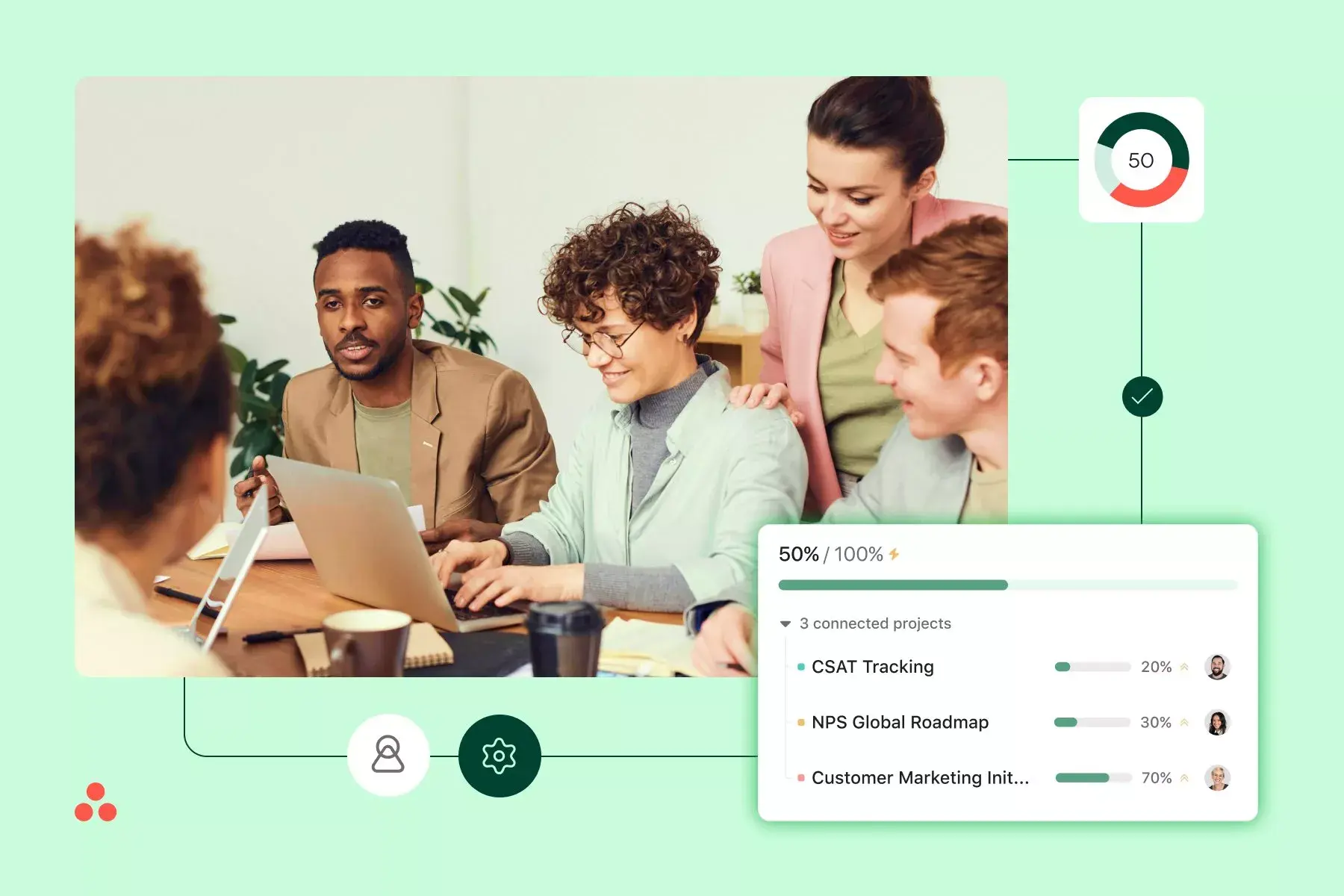
Unmanaged business goals don’t work. Here’s what does.

How Asana uses work management to drive product development

How Asana uses work management to streamline project intake processes
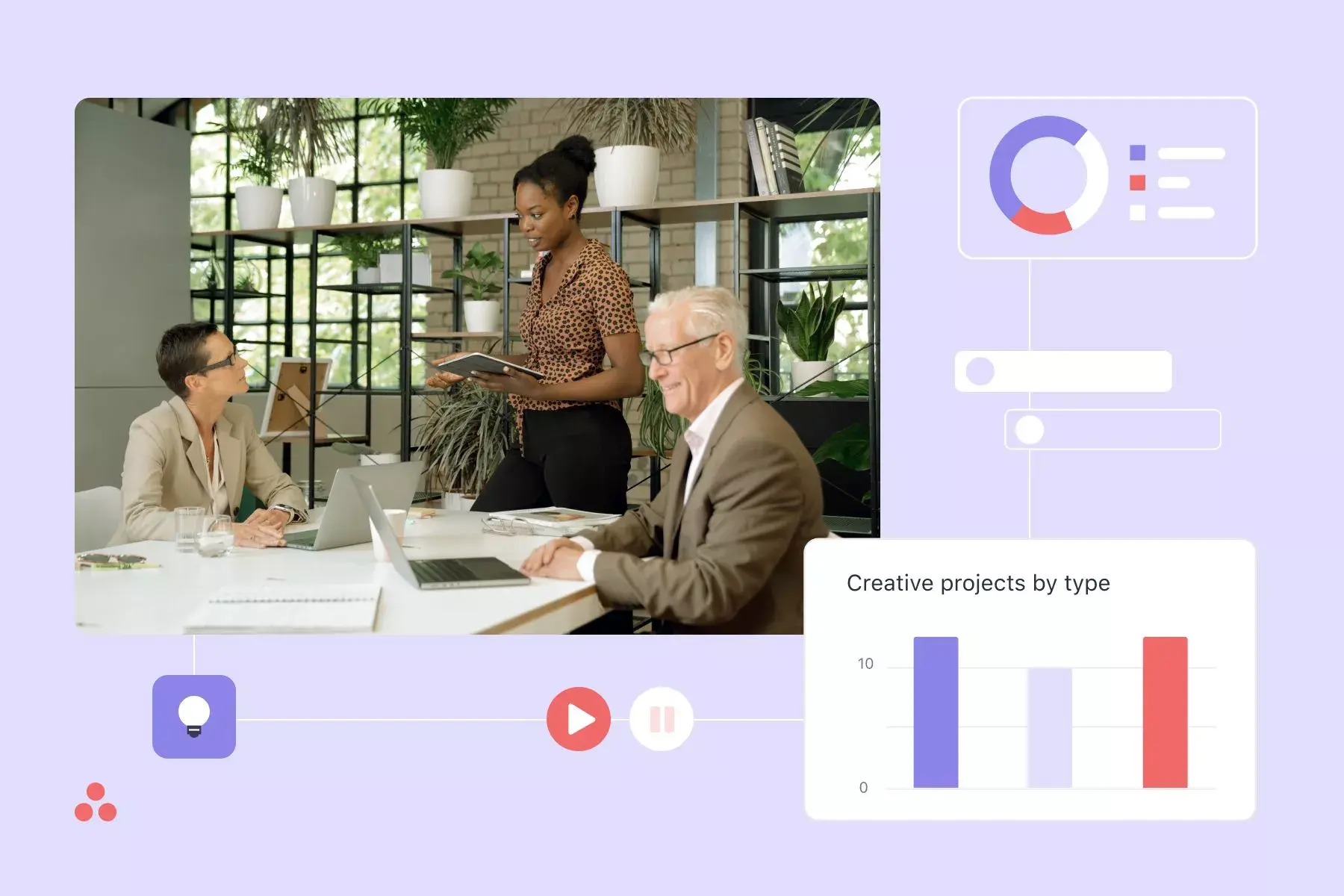
How Asana uses work management for smoother creative production

COMMENTS
The Michigan Council of Teachers of English is currently hosting the Michigan Youth Arts Festival Creative Writing Workshop from May 9 th to May 11 th, 2019. Students in grades 9 through 12 are encouraged in creative writing projects in categories like short stories, poetry, playwriting, graphic narration, and creative nonfiction.
Michigan Writers is a community of writers, poets, editors, teachers, critics, readers, designers, ... "Tell Your Story," we offer a writing workshop that can... February 24, 2022. Not Just Nature Writing (Free Workshop from Michigan Writers) Featured, Workshops. 0.
Offers writing workshops, panels, readings, and more amid the beauty of Northern Michigan. Detroit Working Writers. Men and women from around the country working, writing and publishing in numerous genres with a common goal: to foster excellence in writing and serve as a creative and professional resource for one another and the community.
EVENT LOCATION & DETAILS: 9:30 a.m. - 5 p.m., Saturday, May 4, 2024 — at the Embassy Suites Detroit - Livonia/Novi, 19525 Victor Parkway, Livonia, MI 48152. (Please note that this is an in-person event. We at Writing Day Workshops plan both online/virtual as well as in-person events. This next MWW is an in-person event happening in the ...
To encourage creative writing of the highest professional standard and serve as a creative and professional resource for one another and the community. ... Workshops; Contact . Welcome! As you might expect from a writing organization founded in June of 1900 that has stood the test of time, members of Detroit Working Writers are top-notch and ...
Our creative writing programs provide the structure, guidance, and interaction you need to refine your expression and develop productive processes. ... Two Interlochen Arts Academy seniors weigh in on academic classes, instructor quality, and more. November 15, 2023. ... Interlochen, MI 49643. Main Switchboard: 231.276.7200 Campus Safety: 231. ...
We support students by offering one-on-one peer writing consultations, writing workshops, graduate and creative writing groups, and student employment opportunities. ... The Michigan Writing Centers Association (MiWCA) annual conference took place at Grand Valley State University on October 28, 2023. This was the first time since pre-COVID-19 ...
The Workshops: 5 - 8 people in Online Workshops using Zoom. 8 - 10 people in In-Person Workshops--On-Site in Chelsea, MI. Afternoon and 8 & 10-Week Writing Workshops. Attention to craft is taken seriously, and offered through 1 - 20 minute writing exercises. Writers, if they wish, read their work aloud.
Michigan Writing Workshop, Livonia, Michigan. 1,009 likes · 74 talking about this · 1 was here. The Michigan Writing Workshop is a one-day writers conference outside Detroit on Saturday, May 4, 2024.
The Oomen-Schultz scholarship is awarded annually to (one or more) eligible participants in the Interlochen College of Creative Arts (ICCA) Writers Retreat. The scholarship funds awarded will cover the applicant's registration fee for the retreat. Award is competitive and merit-based. Class Session 4 and 5: (Mandatory for Oomen workshop only!)
If the state of Michigan or the United States government forbids entry to the state of Michigan, or if Mission Point Resort closes, for the dates of September 9 - 13, 2024, Writing Workshops will offer a full refund for program fees. Writing Workshops will not reimburse for any airline tickets or additional trip-related expenses incurred.
WRITING FICTION. Elissa Cahn / Online with Zoom. Thu 4/11-5/16. 6:30 - 9 pm / 6 weeks. $185 / Members: $165.
Through InsideOut's creative writing programs, students learn to think broadly, create bravely, and share their voices with the wider world. We provide students ages 6-19 with opportunities for self-expression, mentoring, academic support, and a platform to be heard. We have served 70,000 students and counting. At this crucial time in Detroit ...
We founded the Madison Writers' Studio in 2013 with the goal of bringing MFA-level writing instruction to an intimate workshop setting. We believe the best way to study writing is face-to-face, in small groups. Our workshops are casual yet challenging, held in the homes of our passionate, experienced, and widely published instructors.
Program Requirements. The Helen Zell Writers' Program is a two-year, fully-funded graduate program in creative writing leading to the Master of Fine Arts degree. A third-year post-MFA Zell Fellowship will be available to six qualifying graduates of our program. HZWP students concentrate in either fiction or poetry and must complete 36 total ...
The majority of students at the University of Michigan fulfill the first-year writing requirement through our three 100-level courses: English 124, English 125 and English 126. ... 125 or 126, many students also choose to take our 200-level courses in creative writing, argumentative writing, and professional writing. Advanced students may be ...
Creative Writing Courses: choose a minimum of two Residential College creative writing courses that focus on writing fiction, creative nonfiction, or poetry. Only one course in a student's major plan should be at the 200-level: ... MI 48109-1245 [email protected]. Engaged Michigan Partner RC Portal for Students, Staff, and Faculty.
Students work with local literary organizations like InsideOut Literary Arts, 826 Michigan and the new Detroit chapter of City of Asylum. ... Techniques of Imaginative Writing, but the prerequisite for all upper-level creative writing courses is English 3800: Introduction to Creative Writing. Our most advanced course, English 6800: Advanced ...
We offer a sequence of workshops introducing students to a variety of writing styles, methods, and forms, as well as topics and inquiries essential to current trends in creative writing. By critiquing their peers' creative works, students will engage in a culture of collaboration and review. By studying literary models and theoretical ...
THE PROGRAM. The Creative Writing Program offers undergraduate writers a focused, adventurous experience in creative expression. The Program's nationally recognized, award-winning faculty teach a wide variety of courses on genre-specific craft across fiction, poetry, play-writing and creative non-fiction. As practicing writers, the program ...
The creative writing concentration at MSU offers students a program that blends foundational work in literary studies, exploration of creative writing in multiple genres, and a focused capstone experience. ... writing workshops, brown bag lunch conversations with faculty and visiting writers. The Michigan State University English Department is ...
In the spirit of collaboration, Assistant Professors Dr. Margaret Morris and Dr. Bree Straayer teamed up with Ethan Voss and Mary Murdock, both graduate students in the Master of Arts (MA) in Rhetoric and Writing program, to teach two P2W courses this spring semester: Writing in Corporate Contexts (WRA 333), taught by Dr. Morris and Voss
Get Your Writing Published: May 4, 2024. ADDED ONLINE PITCHING: To ensure that writers have a robust and diverse lineup of agents & editors to pitch, 2024 Michigan Writing Workshop attendees will have the ability to also pitch literary agents at the Writing Day Workshops *online* event that follows the 2024 MWW on our calendar.. That event is the Pittsburgh Writing Workshop, May 31 - June 1 ...
This is an informal creative writing workshop for adults. Writing prompts will be provided at the beginning of the 1 hour program to help your ideas to flow. But you may start writing with your own prompt or own creative idea(s). This will be a space for all writing levels to come together to peacefully write and share ideas, ask for feedback, etc. Writing materials will be provided. Please be ...
Take a look at these "must-haves" for every creative brief. Whether you're planning a marketing campaign, writing a creative brief for an advertising agency, or preparing a creative brief for your internal team, these nine steps will help you clarify the key information your team needs for success.